Craig Cliff's Blog, page 10
December 4, 2017
Life the damper: Fortnight 22 of the Burns
Addendum to consumption
In addition to all the November reading and watching I discussed yesterday, I should also say I've been working through Werner Herzog's filmmaking masterclass on, uh, Masterclass.
I actually did the Aaron Sorkin scriptwriting masterclass at the start of the year (it costs money but it's for my novel so: tax deductible) and it helped me get inside the mind of a scriptwriter and to think about structure for film and TV in deeper and more nuanced ways (not saying it's totally deep and nuanced, just that my starting point was pretty superficial).
But my novel is more about filmmaking rather than scriptwriting. I didn't really know that in January but I do now.
Because I did the Sorkin course, Masterclass spams me with other courses I should take. I took notice when they said there'd be a Martin Scorsese one in early 2018. And if I paid the cost of that course now, I could have access to ALL masterclasses for 12 months.
(This sounds like a paid advertorial at the start of a podcast, but I promise it isn't.)
So I started watching Herzog's videos and he got his hooks into me. I've watched Fitzcarraldo (didn't like it) and Grizzly Man (meh), but that's probably it. I did listen to a DIrector's Guild of America podcast where Kevin Smith interviewed Herzog after the premier of Fire and Blood. Herzog says some of the same things in his Masterclass as he does in that podcast, but it's much easier to focus on Herzog's message when it isn't accompanied by Kevin Smith's post-ironic wonder at the fact Herzog reads books or goes through the films budget with the accountant every night during the shoot.
Herzog is better without that. As a character study of him alone, the masterclass is worth the time.
Oh, alright...
I was stalling, but here are the numbers from last fortnight:
Fortnight 22 wordcounts
Total words: 6,899 (17% on the novel, 26% on this blog, 57% on non-fiction)
1st week: 3,018
2nd week: 3,881
The non-fiction was prep for two talks I gave and an email interview with a website in the US ahead of THE MANNEQUIN MAKERS release there on 12 Dec.
But yeah, a crappy fortnight in terms of productivity and quadruply so when you think I really wanted to leave Dunedin with a first draft of my novel complete but I could only muster 1,150 words on the beast in 14 days.
The last time I worked on the novel was 22 November.
Eek.
How come?
Here's how come
Well, I was in Wellington for five days (school visits for my daughter, catching up with friends and Ministry colleagues).
And we stayed in this cool old place right by the beach at Island Bay and the weather was great and, and, and... I'm not really complaining.
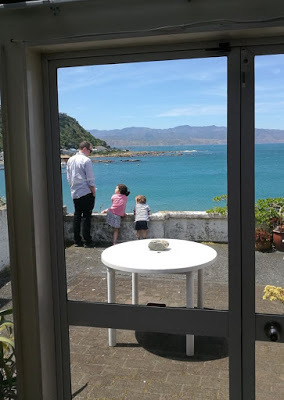
And when I got back from Wellington.I prepared for and gave two talks, and took part in a daylong workshop.
My first speaking engagement was at the Southern Cities Creative Hui on 30 November. I spent the whole day there, because the lineup of speakers was pretty darn impressive, with Kiwis like Hera Lindsay Bird, Shayne Carter and Victor Rodger, and visitors from Italy, Papua New Guinea and Australia.
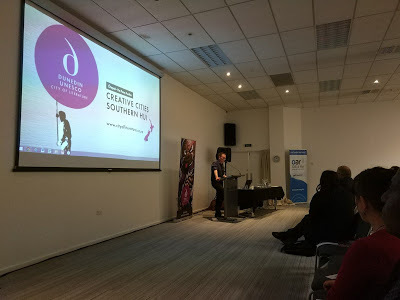 Shayne Carter reading from his memoir-in-progressMy keynote was on digital and analogue perspectives on storytelling, keying in on what a novelist (me) thinks when playing a narrative-driven game mode of a basketball simulation (NBA 2K18's My Career mode).
Shayne Carter reading from his memoir-in-progressMy keynote was on digital and analogue perspectives on storytelling, keying in on what a novelist (me) thinks when playing a narrative-driven game mode of a basketball simulation (NBA 2K18's My Career mode).
At afternoon tea I bonded with Shayne Carter over our shared love of the NBA. I had a slide of my created player in a Sacramento Kings jersey, and he told me how much he loved the Kings when they had Demarcus Cousins and Isaiah Thomas, and I was like, Bro!
I'd previously confessed to him that I'd used a computer programme to mash his lyrics from Straitjacket Fits days with a bunch of other Dunedin Sound bands to make "poetry" and he'd seemed genuinely interested instead of horrified or, worse, bored.
So I'm left with one question: did I just make friends with a rock star?
(Pause for effect)
Did I mention that his memoir will be amazing if the snippet he read is anything to go by? I think I did on Twitter, at least.
The next day of the Hui was a collaborative futures workshop in the basement of the Athenaeum (an old library on the Octagon).
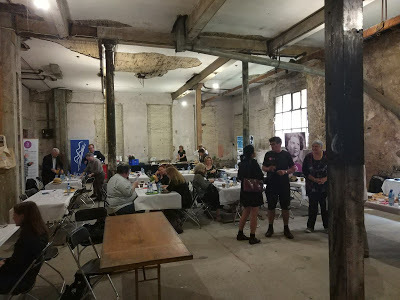 Basement of the AthenaeumI took part because I'm kind of in love with this city and even though I'm moving back to Wellington (*sad trombone*), I wanted to be part of brainstorming ways to take the UNESCO City of Literature thing further and connect Dunedin more widely with other UNESCO creative cities.
Basement of the AthenaeumI took part because I'm kind of in love with this city and even though I'm moving back to Wellington (*sad trombone*), I wanted to be part of brainstorming ways to take the UNESCO City of Literature thing further and connect Dunedin more widely with other UNESCO creative cities.
(Did I mention that, as a Burns Fellow, I'm now eligible to go on City of Literature residencies, even if I stop living in Dunedin? It's like an open relationship without the bit where one or more people get their hearts broken.)
I had to head up the hill during the lunch break to talk to the Otago Association of Teachers of English.
Their Big Day Out for Professional Development had two keynote speakers to break up their workshops. In the morning they heard from someone from the Dunedin Study (so, you know, evidence based and world renowned) and in the afternoon they heard from me.
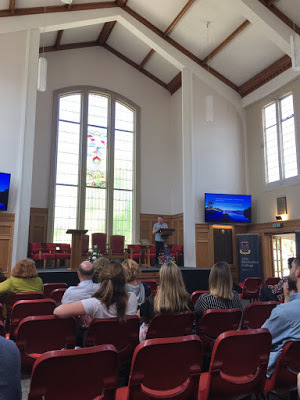 Addressing OATEI had an hour to fill, and did so by talking about to join two bad ideas to make a novel (stepping through the genesis of both THE MANNEQUIN MAKERS and my location scout novel-in-progress), read from the novel-in-progress (the chapter 'Pietrarubbia'), talked about my experiments with artificial intelligence and read one of the Dunedin poems (see above), and also covered video games (see above), before ending with my reckons on teaching English in 2018 and beyond.
Addressing OATEI had an hour to fill, and did so by talking about to join two bad ideas to make a novel (stepping through the genesis of both THE MANNEQUIN MAKERS and my location scout novel-in-progress), read from the novel-in-progress (the chapter 'Pietrarubbia'), talked about my experiments with artificial intelligence and read one of the Dunedin poems (see above), and also covered video games (see above), before ending with my reckons on teaching English in 2018 and beyond.
It was a bit weird talking about St Joseph of Copertino and questions of faith in a high school chapel, and the mic crapped out after about 15 minutes with a lot of time and a large space to fill, but all in all I had fun and some of the teachers (the younger ones) commented that they got something out of it.
Yay.
Past tense
After that rush of public appearances, my dance card is pretty clear.
I've got to judge the Robbie Burns poetry comp and attend the ceremony on 25 Jan, and that's all I can think of.
But don't think I'll suddenly get back on top of the novel and knock out a couple 20K fortnights.
There's this thing called Christmas (we'll be spending it in Chch).
And the move back to Wellington (the packing, the logistics, the drive up with a few stops along the way).
And I've agreed to review four books in the next two months.
And my son is sick again and my wife has run out of sick leave (her contract is up just before Xmas).
And there's already a photo of me up on the second floor of the Uni library, as if I've already left, or died, or both.
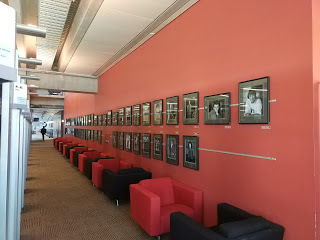
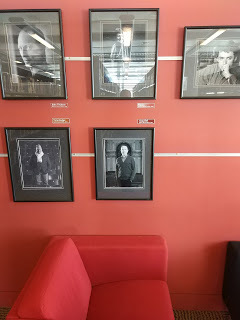
May my tombstone read: He set terrific goals.
In addition to all the November reading and watching I discussed yesterday, I should also say I've been working through Werner Herzog's filmmaking masterclass on, uh, Masterclass.
I actually did the Aaron Sorkin scriptwriting masterclass at the start of the year (it costs money but it's for my novel so: tax deductible) and it helped me get inside the mind of a scriptwriter and to think about structure for film and TV in deeper and more nuanced ways (not saying it's totally deep and nuanced, just that my starting point was pretty superficial).
But my novel is more about filmmaking rather than scriptwriting. I didn't really know that in January but I do now.
Because I did the Sorkin course, Masterclass spams me with other courses I should take. I took notice when they said there'd be a Martin Scorsese one in early 2018. And if I paid the cost of that course now, I could have access to ALL masterclasses for 12 months.
(This sounds like a paid advertorial at the start of a podcast, but I promise it isn't.)
So I started watching Herzog's videos and he got his hooks into me. I've watched Fitzcarraldo (didn't like it) and Grizzly Man (meh), but that's probably it. I did listen to a DIrector's Guild of America podcast where Kevin Smith interviewed Herzog after the premier of Fire and Blood. Herzog says some of the same things in his Masterclass as he does in that podcast, but it's much easier to focus on Herzog's message when it isn't accompanied by Kevin Smith's post-ironic wonder at the fact Herzog reads books or goes through the films budget with the accountant every night during the shoot.
Herzog is better without that. As a character study of him alone, the masterclass is worth the time.
Oh, alright...
I was stalling, but here are the numbers from last fortnight:
Fortnight 22 wordcounts
Total words: 6,899 (17% on the novel, 26% on this blog, 57% on non-fiction)
1st week: 3,018
2nd week: 3,881
The non-fiction was prep for two talks I gave and an email interview with a website in the US ahead of THE MANNEQUIN MAKERS release there on 12 Dec.
But yeah, a crappy fortnight in terms of productivity and quadruply so when you think I really wanted to leave Dunedin with a first draft of my novel complete but I could only muster 1,150 words on the beast in 14 days.
The last time I worked on the novel was 22 November.
Eek.
How come?
Here's how come
Well, I was in Wellington for five days (school visits for my daughter, catching up with friends and Ministry colleagues).
And we stayed in this cool old place right by the beach at Island Bay and the weather was great and, and, and... I'm not really complaining.

And when I got back from Wellington.I prepared for and gave two talks, and took part in a daylong workshop.
My first speaking engagement was at the Southern Cities Creative Hui on 30 November. I spent the whole day there, because the lineup of speakers was pretty darn impressive, with Kiwis like Hera Lindsay Bird, Shayne Carter and Victor Rodger, and visitors from Italy, Papua New Guinea and Australia.
 Shayne Carter reading from his memoir-in-progressMy keynote was on digital and analogue perspectives on storytelling, keying in on what a novelist (me) thinks when playing a narrative-driven game mode of a basketball simulation (NBA 2K18's My Career mode).
Shayne Carter reading from his memoir-in-progressMy keynote was on digital and analogue perspectives on storytelling, keying in on what a novelist (me) thinks when playing a narrative-driven game mode of a basketball simulation (NBA 2K18's My Career mode).At afternoon tea I bonded with Shayne Carter over our shared love of the NBA. I had a slide of my created player in a Sacramento Kings jersey, and he told me how much he loved the Kings when they had Demarcus Cousins and Isaiah Thomas, and I was like, Bro!
I'd previously confessed to him that I'd used a computer programme to mash his lyrics from Straitjacket Fits days with a bunch of other Dunedin Sound bands to make "poetry" and he'd seemed genuinely interested instead of horrified or, worse, bored.
So I'm left with one question: did I just make friends with a rock star?
(Pause for effect)
Did I mention that his memoir will be amazing if the snippet he read is anything to go by? I think I did on Twitter, at least.
The next day of the Hui was a collaborative futures workshop in the basement of the Athenaeum (an old library on the Octagon).
 Basement of the AthenaeumI took part because I'm kind of in love with this city and even though I'm moving back to Wellington (*sad trombone*), I wanted to be part of brainstorming ways to take the UNESCO City of Literature thing further and connect Dunedin more widely with other UNESCO creative cities.
Basement of the AthenaeumI took part because I'm kind of in love with this city and even though I'm moving back to Wellington (*sad trombone*), I wanted to be part of brainstorming ways to take the UNESCO City of Literature thing further and connect Dunedin more widely with other UNESCO creative cities.(Did I mention that, as a Burns Fellow, I'm now eligible to go on City of Literature residencies, even if I stop living in Dunedin? It's like an open relationship without the bit where one or more people get their hearts broken.)
I had to head up the hill during the lunch break to talk to the Otago Association of Teachers of English.
Their Big Day Out for Professional Development had two keynote speakers to break up their workshops. In the morning they heard from someone from the Dunedin Study (so, you know, evidence based and world renowned) and in the afternoon they heard from me.
 Addressing OATEI had an hour to fill, and did so by talking about to join two bad ideas to make a novel (stepping through the genesis of both THE MANNEQUIN MAKERS and my location scout novel-in-progress), read from the novel-in-progress (the chapter 'Pietrarubbia'), talked about my experiments with artificial intelligence and read one of the Dunedin poems (see above), and also covered video games (see above), before ending with my reckons on teaching English in 2018 and beyond.
Addressing OATEI had an hour to fill, and did so by talking about to join two bad ideas to make a novel (stepping through the genesis of both THE MANNEQUIN MAKERS and my location scout novel-in-progress), read from the novel-in-progress (the chapter 'Pietrarubbia'), talked about my experiments with artificial intelligence and read one of the Dunedin poems (see above), and also covered video games (see above), before ending with my reckons on teaching English in 2018 and beyond.It was a bit weird talking about St Joseph of Copertino and questions of faith in a high school chapel, and the mic crapped out after about 15 minutes with a lot of time and a large space to fill, but all in all I had fun and some of the teachers (the younger ones) commented that they got something out of it.
Yay.
Past tense
After that rush of public appearances, my dance card is pretty clear.
I've got to judge the Robbie Burns poetry comp and attend the ceremony on 25 Jan, and that's all I can think of.
But don't think I'll suddenly get back on top of the novel and knock out a couple 20K fortnights.
There's this thing called Christmas (we'll be spending it in Chch).
And the move back to Wellington (the packing, the logistics, the drive up with a few stops along the way).
And I've agreed to review four books in the next two months.
And my son is sick again and my wife has run out of sick leave (her contract is up just before Xmas).
And there's already a photo of me up on the second floor of the Uni library, as if I've already left, or died, or both.


May my tombstone read: He set terrific goals.
Published on December 04, 2017 14:37
December 3, 2017
November consumption diary
MUSIC
After years of steadfastly holding out till the year was actually complete, I feel pressured to declare my top albums of the year this side of Christmas. I think it's all this time I'm supposed to have, being a full-time writer. I've been run off my feet lately (Fortnight 22 post to follow) without making any tangible progress, so a trivial listsicle probably shouldn't be top of the list. But I also want to know what my top albums have been this year... and the only way to figure this out is to do the mahi and create the post.
Anyway, here were the tracks that tickled me in the eleventh month of 2017 (recency bias suggests artists appearing here could be heavily represented in my end of year list):
FILM
Human Traces
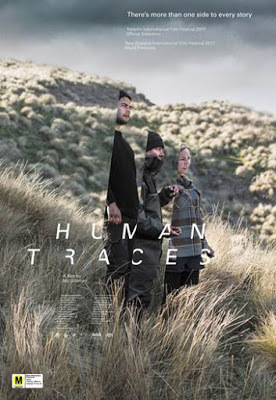 This one gets a special mention as it's a NZ film and I saw it in the cinema (11am session on a Thursday in Dunedin... there was one other dude in the theatre - I'm gonna miss the freedom to watch serious movies during the day on my lonesome).
This one gets a special mention as it's a NZ film and I saw it in the cinema (11am session on a Thursday in Dunedin... there was one other dude in the theatre - I'm gonna miss the freedom to watch serious movies during the day on my lonesome).
The film is set on a subantarctic island (like a chunk of my novel THE MANNEQUIN MAKERS, but the island in the movie is fictional and the setting is contemporary rather than historical), although it was filmed in the Catlins and Banks Peninsula. Speaking of the Catlins, in the novel I'm working on, the main character is a filmmaker whose first feature film is called CURIO BAY, and is set entirely in... the Catlins.
So, like, there's a similar wavelength thing happening here. How could I not check it out?
And those first ten minutes, I had trouble getting over myself and just sitting in the film.
Like, there's a scene where there's a party to farewell the departing ranger and welcome the new one (so: 5 people in a hut listening to a cassette) and the song that's playing is 'Death and the Maiden' by The Verlaines, which just so happened to be the first song on my playlist for THE MANNEQUIN MAKERS. (And because the film is told in three, overlapping parts, this song features more than once).
A few seconds later, a character uses the term 'acolyte', ('Are you happy just being his acolyte?') which seems a little high-flown for the character and setting, but it's used a couple more times, calling back to this question.
And guess what? I used the term 'acoltye' in THE MANNEQUIN MAKERS! Chapter four is even subtitled: 'In which the acolyte makes himself at home'.
Such is the lunacy of a writer in NZ watching a film by another NZer. Or maybe it's just my own special brand of lunacy?
(This tendancy to see your work in others' is a distant cousin of 'outspiration',which I discussed in July.)
Like I said, after a while I got over myself / the film sucked me in. I would have liked more wildlife (no albatross? sacrilege!), but I understand the practicalities of getting those shots in a fudged location.
In terms of cinematography, it's a challenge to depict slices of mainland coast as an isolated island in the Roaring Forties. There are a lot of handheld shots, which seemed to push too hard for 'thereness', as if the crew was never quite sold on letting what was in frame tell the story.
This is Nic Gorman's first feature as both director and writer, and there's so much to like about what he's achieved.
In terms of story, I love how it goes dark at the end of the first third -- like, real dark -- without then descending into horror or pointless gore. Sadly, we make so few feature films in NZ that many will see this darkness as a typical feature of our filmmaking (like our fiction) and dismiss it as unoriginal or dated, when in fact it's just part of this particular story. The battle of man versus the rest of mankind who are against mother nature - how could it not get a little gory and nihilistic??
Without wanting to get too spoilery, I really liked how the reveal of what Riki had done to Pete early in the third section. It was such a light touch and left me space to fill in the gaps. I was satisfied with what must've only taken thirty seconds of screen time. Sadly the film felt the need to cut back to this backstory again later, and again, until it was all explained and over-explained and (of course) I liked my version better.
One other gripe: How could Riki know the internal antenna bit was missing? Tellingly, this scene (from part 2) does not recur in part 3 when we know how much of a greenhorn Riki is. Of course, if the film did explain that Riki had done a polytech course in radio repair I would have griped about having too much explained, so I'm tough to please!
I want to balance this nit-picking with more of the stuff I liked, but I also want you all to see this movie. If not on the big screen, rent it, stream it, do whatever you need to do when you next encounter this film. Because it's worth your time and money, and it's cool that people are allowed to make movies like this and we gotta support them, eh?
Other films this month:John WickThe Hunt for the WilderpeopleThe Centre Will Not HoldLa Dolce Vita
BOOKS
The Angel Esmeralda by Don DeLillo (short stories, audiobook)
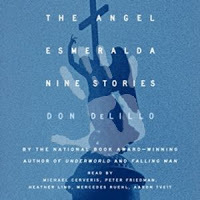 I’ve read a fair number of DeLillo’s novels and my initial responses (noting these were read over about 15 years) range from love (White Noise), like (Mao II), ambivalence (Underworld– though I’d consider re-reading it – and the two shorter books that immediately followed: The Body Artist and Cosmopolis) to outright dislike (Great Jones Street).
I’ve read a fair number of DeLillo’s novels and my initial responses (noting these were read over about 15 years) range from love (White Noise), like (Mao II), ambivalence (Underworld– though I’d consider re-reading it – and the two shorter books that immediately followed: The Body Artist and Cosmopolis) to outright dislike (Great Jones Street).
This collection falls into the 'ambivalent' basket.
I’d already heard the first two stories before. But no, this wasn’t another Bark episode. I hadn’t read the entire collection before and forgotten about it.
But am I a chance of doing that some time in the future with this collection? Perhaps. There’s something so distant about these stories that doesn’t leave much to latch onto.
A Game of Thrones Pt 2 by George RR Martin (novel, audiobook)
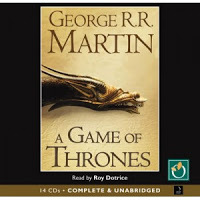
The second half of the first book in the Song of Fire and Ice, but another 16 or so hours of audio if listened to at single speed (I listened to it faster).
I think I’ve found the perfect kind of audiobook to race through: one you know the main plot points but are actually interested in the minutiae or being reminded of things you may have once known.
A Feast for Crows is up next. At this pace (one half-book a month) I should finish all the extant books before the final season of the TV show (let alone when GRRM gets around to finishing the final book).
The Satanic Verses by Salman Rushie (novel, audiobook)
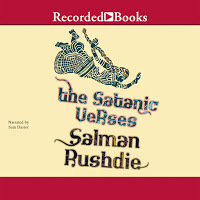 Um.
Um.
This is one of those books that I can’t react to in any other way than as a mirror held up to my own writing, or the tendencies I see in my writing.
Like: the whole magic-realism thing, which doesn’t often fly for me as a reader (I tend to love the first 100 pages of a Garcia Marquez novel and my enthusiasm gets whittled down to nothing by the end) and yet my own writing is drawn into this sphere if I’m not careful.
Then there’s the linguistic excess and the dexterous/devilish narrator. All things I’m screwing down at the moment in the service of telling a story about fantastical things without sounding like Marquez or Rushdie or one of the Apostles.
Anyway, this particular book. It was long (22 hours as an audiobook), with lots of sub- and parallel plots, and my interest was whittled away rather than held.
But I did take things away from the process.
Like: the irony of the Fatwa that followed the publication of the book.
And what Rushdie is saying about the immigrant experience.
And just some stunning lines about contemporary Britain, which were relevant in 1988 but are probably more so now… which says something, perhaps, about the uselessness of literature – even literature paid the compliment of taking seriously / taking offence.
Hollywood: Mecca of the Movies by Blaise Cendrars (non-fiction, translated by Garrett White)
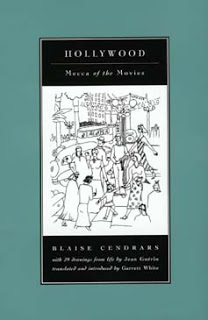 I have the third book of Cendrars' memoirs on my bedside table. The one in which he discusses San Giuseppe da Copertino at length. In English the title is rendered as Sky: memoirs, though a more direct translation would be The Apportionment of the Heavens.
I have the third book of Cendrars' memoirs on my bedside table. The one in which he discusses San Giuseppe da Copertino at length. In English the title is rendered as Sky: memoirs, though a more direct translation would be The Apportionment of the Heavens.
But I read THIS book first because it was in the Otago Uni library and I won’t always have the luxury of being two minutes away from it (or having a valid library card).
Cendrars visit was in 1936, but much of it rang true for me (and the Hollywood I’ve been writing about this year / the Hollywood that is going through one of its semi-regular implosions).
As Garrett White puts it at the end of his intro: “He [Cendrars] was here for two weeks. He got it right.”
Like this description of mementos sailors sought while on shore leave in LA: “Mickey Mouse dolls and toys, Charlie Chaplin’s tiny moustache stuck to an elastic string, Greta Garbo’s alleged wisdom teeth, Mae West’s alleged fingernails in a jewellery box, tufts of hair, unpublished photos, sachets containing a glove, a slim stocking, a flower, each worn by this or that star in such and such a movie - suggestive fetishes these brave sailors carry off to their distant countries as the holy relics of the modern navigator." (p20)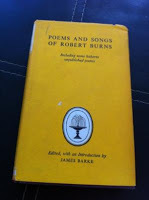 Poems and Songs of Robert Burns (poetry)
Poems and Songs of Robert Burns (poetry)
Reading ahead of my judging duties for the Robbie Burns Poetry competition. Might say more about this after I'm done with that.
Cart and Cwidder – Dianna Wynne Jones (novel, audiobook)
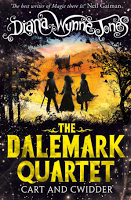 I don't consume a lot of YA fiction, and will be demonstrating this when I say that this novel, the first in the Dalemark Quartet, reminded me of The Chaos Walking trilogy (without the aliens or talking dog or...).
I don't consume a lot of YA fiction, and will be demonstrating this when I say that this novel, the first in the Dalemark Quartet, reminded me of The Chaos Walking trilogy (without the aliens or talking dog or...).
It's the kind of novel where not a lot happens. And even when it does (Clennen's murder), it is described so plainly it's impact isn't immediately felt.
Did it feel like it was written in 1975? No. It could have been written today. I could see my daughter enoying it in a scarily small number of years. Heck, I enjoyed it, I think. I was certaily sucked into the world and the character of Moril in particular.
Maybe all the Game of Thronsing has tenderised that particular part of my reading brain and now I just can't get enough about divided kingdoms and downplayed magic?
After years of steadfastly holding out till the year was actually complete, I feel pressured to declare my top albums of the year this side of Christmas. I think it's all this time I'm supposed to have, being a full-time writer. I've been run off my feet lately (Fortnight 22 post to follow) without making any tangible progress, so a trivial listsicle probably shouldn't be top of the list. But I also want to know what my top albums have been this year... and the only way to figure this out is to do the mahi and create the post.
Anyway, here were the tracks that tickled me in the eleventh month of 2017 (recency bias suggests artists appearing here could be heavily represented in my end of year list):
FILM
Human Traces
 This one gets a special mention as it's a NZ film and I saw it in the cinema (11am session on a Thursday in Dunedin... there was one other dude in the theatre - I'm gonna miss the freedom to watch serious movies during the day on my lonesome).
This one gets a special mention as it's a NZ film and I saw it in the cinema (11am session on a Thursday in Dunedin... there was one other dude in the theatre - I'm gonna miss the freedom to watch serious movies during the day on my lonesome). The film is set on a subantarctic island (like a chunk of my novel THE MANNEQUIN MAKERS, but the island in the movie is fictional and the setting is contemporary rather than historical), although it was filmed in the Catlins and Banks Peninsula. Speaking of the Catlins, in the novel I'm working on, the main character is a filmmaker whose first feature film is called CURIO BAY, and is set entirely in... the Catlins.
So, like, there's a similar wavelength thing happening here. How could I not check it out?
And those first ten minutes, I had trouble getting over myself and just sitting in the film.
Like, there's a scene where there's a party to farewell the departing ranger and welcome the new one (so: 5 people in a hut listening to a cassette) and the song that's playing is 'Death and the Maiden' by The Verlaines, which just so happened to be the first song on my playlist for THE MANNEQUIN MAKERS. (And because the film is told in three, overlapping parts, this song features more than once).
A few seconds later, a character uses the term 'acolyte', ('Are you happy just being his acolyte?') which seems a little high-flown for the character and setting, but it's used a couple more times, calling back to this question.
And guess what? I used the term 'acoltye' in THE MANNEQUIN MAKERS! Chapter four is even subtitled: 'In which the acolyte makes himself at home'.
Such is the lunacy of a writer in NZ watching a film by another NZer. Or maybe it's just my own special brand of lunacy?
(This tendancy to see your work in others' is a distant cousin of 'outspiration',which I discussed in July.)
Like I said, after a while I got over myself / the film sucked me in. I would have liked more wildlife (no albatross? sacrilege!), but I understand the practicalities of getting those shots in a fudged location.
In terms of cinematography, it's a challenge to depict slices of mainland coast as an isolated island in the Roaring Forties. There are a lot of handheld shots, which seemed to push too hard for 'thereness', as if the crew was never quite sold on letting what was in frame tell the story.
This is Nic Gorman's first feature as both director and writer, and there's so much to like about what he's achieved.
In terms of story, I love how it goes dark at the end of the first third -- like, real dark -- without then descending into horror or pointless gore. Sadly, we make so few feature films in NZ that many will see this darkness as a typical feature of our filmmaking (like our fiction) and dismiss it as unoriginal or dated, when in fact it's just part of this particular story. The battle of man versus the rest of mankind who are against mother nature - how could it not get a little gory and nihilistic??
Without wanting to get too spoilery, I really liked how the reveal of what Riki had done to Pete early in the third section. It was such a light touch and left me space to fill in the gaps. I was satisfied with what must've only taken thirty seconds of screen time. Sadly the film felt the need to cut back to this backstory again later, and again, until it was all explained and over-explained and (of course) I liked my version better.
One other gripe: How could Riki know the internal antenna bit was missing? Tellingly, this scene (from part 2) does not recur in part 3 when we know how much of a greenhorn Riki is. Of course, if the film did explain that Riki had done a polytech course in radio repair I would have griped about having too much explained, so I'm tough to please!
I want to balance this nit-picking with more of the stuff I liked, but I also want you all to see this movie. If not on the big screen, rent it, stream it, do whatever you need to do when you next encounter this film. Because it's worth your time and money, and it's cool that people are allowed to make movies like this and we gotta support them, eh?
Other films this month:John WickThe Hunt for the WilderpeopleThe Centre Will Not HoldLa Dolce Vita
BOOKS
The Angel Esmeralda by Don DeLillo (short stories, audiobook)
 I’ve read a fair number of DeLillo’s novels and my initial responses (noting these were read over about 15 years) range from love (White Noise), like (Mao II), ambivalence (Underworld– though I’d consider re-reading it – and the two shorter books that immediately followed: The Body Artist and Cosmopolis) to outright dislike (Great Jones Street).
I’ve read a fair number of DeLillo’s novels and my initial responses (noting these were read over about 15 years) range from love (White Noise), like (Mao II), ambivalence (Underworld– though I’d consider re-reading it – and the two shorter books that immediately followed: The Body Artist and Cosmopolis) to outright dislike (Great Jones Street). This collection falls into the 'ambivalent' basket.
I’d already heard the first two stories before. But no, this wasn’t another Bark episode. I hadn’t read the entire collection before and forgotten about it.
But am I a chance of doing that some time in the future with this collection? Perhaps. There’s something so distant about these stories that doesn’t leave much to latch onto.
A Game of Thrones Pt 2 by George RR Martin (novel, audiobook)

The second half of the first book in the Song of Fire and Ice, but another 16 or so hours of audio if listened to at single speed (I listened to it faster).
I think I’ve found the perfect kind of audiobook to race through: one you know the main plot points but are actually interested in the minutiae or being reminded of things you may have once known.
A Feast for Crows is up next. At this pace (one half-book a month) I should finish all the extant books before the final season of the TV show (let alone when GRRM gets around to finishing the final book).
The Satanic Verses by Salman Rushie (novel, audiobook)
 Um.
Um. This is one of those books that I can’t react to in any other way than as a mirror held up to my own writing, or the tendencies I see in my writing.
Like: the whole magic-realism thing, which doesn’t often fly for me as a reader (I tend to love the first 100 pages of a Garcia Marquez novel and my enthusiasm gets whittled down to nothing by the end) and yet my own writing is drawn into this sphere if I’m not careful.
Then there’s the linguistic excess and the dexterous/devilish narrator. All things I’m screwing down at the moment in the service of telling a story about fantastical things without sounding like Marquez or Rushdie or one of the Apostles.
Anyway, this particular book. It was long (22 hours as an audiobook), with lots of sub- and parallel plots, and my interest was whittled away rather than held.
But I did take things away from the process.
Like: the irony of the Fatwa that followed the publication of the book.
And what Rushdie is saying about the immigrant experience.
And just some stunning lines about contemporary Britain, which were relevant in 1988 but are probably more so now… which says something, perhaps, about the uselessness of literature – even literature paid the compliment of taking seriously / taking offence.
Hollywood: Mecca of the Movies by Blaise Cendrars (non-fiction, translated by Garrett White)
 I have the third book of Cendrars' memoirs on my bedside table. The one in which he discusses San Giuseppe da Copertino at length. In English the title is rendered as Sky: memoirs, though a more direct translation would be The Apportionment of the Heavens.
I have the third book of Cendrars' memoirs on my bedside table. The one in which he discusses San Giuseppe da Copertino at length. In English the title is rendered as Sky: memoirs, though a more direct translation would be The Apportionment of the Heavens.But I read THIS book first because it was in the Otago Uni library and I won’t always have the luxury of being two minutes away from it (or having a valid library card).
Cendrars visit was in 1936, but much of it rang true for me (and the Hollywood I’ve been writing about this year / the Hollywood that is going through one of its semi-regular implosions).
As Garrett White puts it at the end of his intro: “He [Cendrars] was here for two weeks. He got it right.”
Like this description of mementos sailors sought while on shore leave in LA: “Mickey Mouse dolls and toys, Charlie Chaplin’s tiny moustache stuck to an elastic string, Greta Garbo’s alleged wisdom teeth, Mae West’s alleged fingernails in a jewellery box, tufts of hair, unpublished photos, sachets containing a glove, a slim stocking, a flower, each worn by this or that star in such and such a movie - suggestive fetishes these brave sailors carry off to their distant countries as the holy relics of the modern navigator." (p20)
 Poems and Songs of Robert Burns (poetry)
Poems and Songs of Robert Burns (poetry)Reading ahead of my judging duties for the Robbie Burns Poetry competition. Might say more about this after I'm done with that.
Cart and Cwidder – Dianna Wynne Jones (novel, audiobook)
 I don't consume a lot of YA fiction, and will be demonstrating this when I say that this novel, the first in the Dalemark Quartet, reminded me of The Chaos Walking trilogy (without the aliens or talking dog or...).
I don't consume a lot of YA fiction, and will be demonstrating this when I say that this novel, the first in the Dalemark Quartet, reminded me of The Chaos Walking trilogy (without the aliens or talking dog or...). It's the kind of novel where not a lot happens. And even when it does (Clennen's murder), it is described so plainly it's impact isn't immediately felt.
Did it feel like it was written in 1975? No. It could have been written today. I could see my daughter enoying it in a scarily small number of years. Heck, I enjoyed it, I think. I was certaily sucked into the world and the character of Moril in particular.
Maybe all the Game of Thronsing has tenderised that particular part of my reading brain and now I just can't get enough about divided kingdoms and downplayed magic?
Published on December 03, 2017 23:38
November 19, 2017
Cream of the sun: Fortnight 21 of The Burns
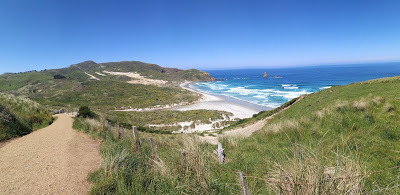 Sandfly BayFortnight 21 wordcountsTotal words: 10,945 (81% on the novel, 16% on this blog, 3% on non-fiction)1st week: 6,1132nd week: 4,832
Sandfly BayFortnight 21 wordcountsTotal words: 10,945 (81% on the novel, 16% on this blog, 3% on non-fiction)1st week: 6,1132nd week: 4,832My son was sick all last week, so I had Monday off to care for him (after taking the previous Monday off to be with my mum & step-dad), and the rest of the week my wife and I split time with the sickie so I could put in 3 or 4 hours on the novel each day and she could keep her experiments on track at her job. There wasn't any sort of manuscript-magnetism at play. It's a slog, but the only way to rekindle the magic is to grind until the next breakthrough, and that means making time when suddenly time is sparse.
If I'm sounding like a stuck record, good. That's how I feel.
The good news is that on Thursday last week I got to the end of tweaking earlier sections so that I can rewrite completely the last 30 pages of the manuscript-so-far (which is to say this won't be the last 30 pages of the novel, but maybe falls somewhere in the 3rd quarter). And I felt positive for the first time in maybe three weeks. Like, maybe people will read this far without throwing the book (or their device) across the room.
So: progress!
The challenge will be keeping up any momentum over the next couple of weeks, with a trip to Wellington to take my daughter for 2x school visits before she starts on day one next year, and then when I get back it's the Creative Cities Southern Hui. I'm also talking to a group of English teachers from Otago/Southland on 1 Dec, so that's another talk/presentation I have to prepare this fortnight. Plus there's more logistics to sort for the move back to Wellington, including what I'm gonna do when I go back to the Ministry of Education (my manager has resigned so Gord knows who I'll be reporting to come February).
And then there's the growing trauma of having to leave this bloody wonderful part of the world.
Today we went to Sandfly Bay, which is only about 15 minutes by car from our house, but thanks to a pretty crazy, duney path down to the beach, is dominated by sea lions rather than humans.
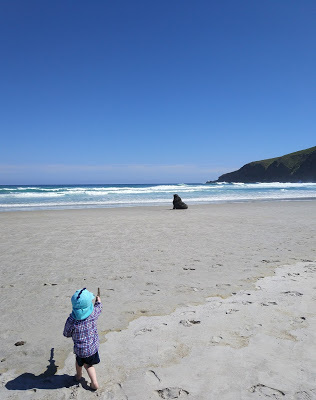 My son pointing (not shooting, no, never shooting) at a sea lion
My son pointing (not shooting, no, never shooting) at a sea lionfrom a respectful distance.Yesterday we went to Mosgiel. I know, Mosgiel. But the playground at Memorial Park there was great, and we found a great dairy with real fruit ice cream (we found one in Green Island two weeks ago... tis the season for tracking down real fruit ice cream).
And the only way to get my son to nap these days is in the car, and being sick, he really needed the rest in the middle of the day, so I've been slowly clearing the fog of war from every corner of the map of greater Dunedin. It's crazy how quickly the city ends and you're suddenly atop a hill with a great view of the city, the harbour, the peninsula or some combo of the three.
Luckily my son was better by Saturday night as my wife and I had been booked in for a degustation dinner at Bracken for months. This was the first dinner out as a couple we've had this year/in Dunedin, so it's only fitting we crammed in seven courses...
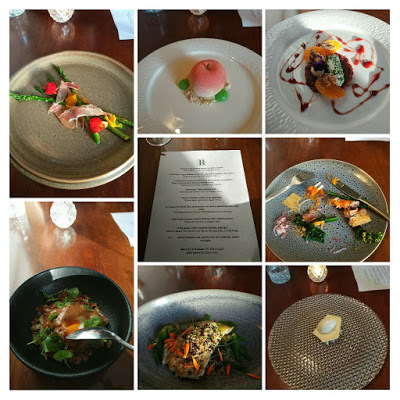
The verdict: there were two deserts, but neither compared with the mini pavs I made for the English & Linguistics Dept morning tea on Friday.
I know, photos or it didn't happen, but I was preoccupied with constructing them on site, and then wham, people arrived and I forgot all about it.
But here's a shot of my trial personal pavlovas (which I decided were too big for single-serve morning tea eat-with-your-hands fare, but my wife's colleagues loved them):
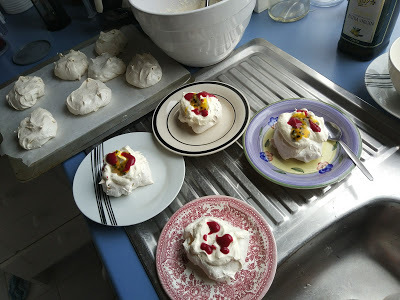
Published on November 19, 2017 00:14
November 6, 2017
Wet matches: Fornight 20 of The Burns
I did some graphs back at the end of Fortnight 10, and should probably do some again now, but it's already Tuesday (I had the day off yesterday to spend with visitors) and I don't really want to diddle round with Excel right now.
Better to open with Dunedin and its surrounds!
All photos from the last fortnight.
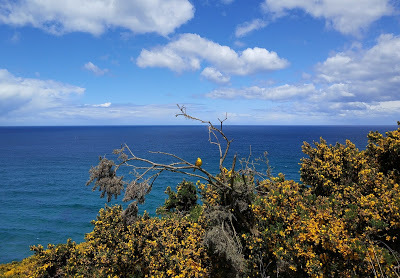 Yellowhammer in the gorse, Tunnel Beach
Yellowhammer in the gorse, Tunnel Beach
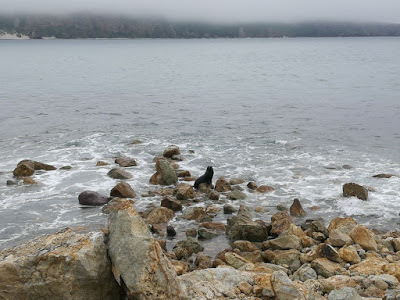 Fur Seal, Aramoana
Fur Seal, Aramoana
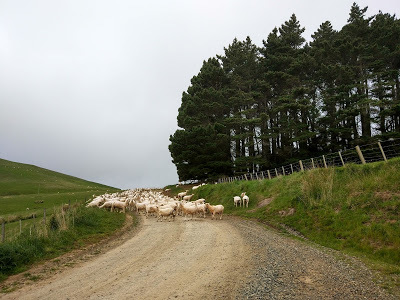 Sheep, blocking the way to Cape Saunders, Otago Peninsula
Sheep, blocking the way to Cape Saunders, Otago Peninsula
(no metaphor intended)
Fortnight 20 wordcountsTotal words: 11,034 (60% on the novel, 26% on this blog, 14% on other non-fiction)1st week: 5,5242nd week: 5,510
Two equally disappointing weeks, symptomatic of the slough I’m in with the novel. For weeks I’d persisted in moving forward, trying to get a first draft done before Christmas, but as the section in San Marino continued to grow, I could feel the tension and interest (mine and the imagined reader’s) trickling away. Something was wrong back at the beginning of the Italian section, but I wasn’t sure what.
So I printed out the 84,000 words I had and read through from the beginning.
Last time I did this (about two months ago), I was pleasantly surprised how much fun it was to read. This time, the first section remained unproblematic, but the laws of diminishing marginal returns had sapped the fun from it.
I managed to find a number of things at the start of the second section that were sapping the potential of the later chapters (and promised to unbalance the whole shebang).
As always, it boils down to a protagonist being too passive, or his/her intention not being clear enough or believable.
I’m in the midst of rewriting these early chapters now and the process will take weeks for me to get back to where I was mid-October.
It’s a pain in the butt, but I think it’s far more efficient to do this work now than keep rambling toward an unsatisfying and ultimately arbitrary finish line.
As for the ending of the book, I see that quite clearly (it’s a shorter section, maybe 10k words, set two years ahead of the rest of the novel) and it hasn’t changed since I dreamed it up back in July.
So it’s really just the large middle section that’s causing all the problems. But nothing is fatal.
Just more work/rework/binning/recycling.
Onward!
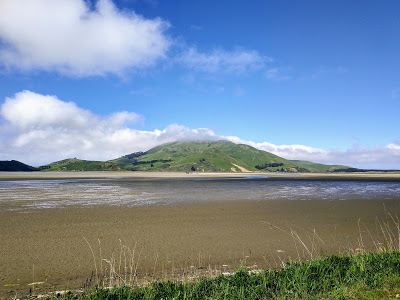 Hoopers Inlet, the peninsulaShort Story Club
Hoopers Inlet, the peninsulaShort Story Club
Last Thursday, my short story, ‘Manawatu’ was discussed as part of Jesse Mulligan’s Short Story Club on Radio NZ National.
From the files I have with me in Dunedin, I can only ascertain that I wrote the story before July 2008 (when I submitted it to Sport). I’m pretty sure this is one of two stories in A Man Melting that I wrote before I did my MA in 2006 (the other being ‘The Tin Man’, though it had a different title). Around the same time, I moved from Hotmail to Gmail, so the trail goes cold in my online archives then, too.
Anyway, I’m pretty sure ‘Manawatu’ is it at least 10 years old. It definitely bears the marks of being written while I lived in Australia (and by an angst-ridden twenty-something).
Re-reading it now, and hearing it be discussed, I’m pleased with how it goes about its business (that very interior, very analytical beginning, carried on to the point it feels confronting, to then have some external action, which is only fully explained when the interior is understood). Not bad for someone a year or two older than the protagonist.
It’s the story I’ve thought about the most this year while writing my location scouting/levitation novel. In part it’s to do with the incredibly close 3rdperson narration, and in part the fact my protagonist is a year or two younger than me and there’s that tension between loading him up with autobiographical elements and letting him realise his true (and truly different from me) character.
So ten or twelve years or whatever it is later, I’m back where I began, angst-ridden and uncertain.
Yep, feels about right.
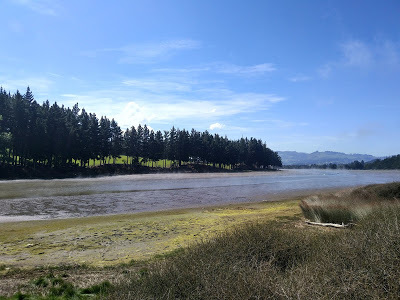 Mist on the water, Kaikorai EstuaryCreative Cities Southern Hui
Mist on the water, Kaikorai EstuaryCreative Cities Southern Hui
I was on RNZ National myself on Sunday, along with Nicky Page, to spruik the Creative Cities Southern Hui which takes place in Dunedin at the end of the month.
Details about the hui here. (It’s a pretty cool lineup when I follow [alphabetically at least], Hera Lindsay Bird and Shayne Carter).
And on my bio page for the hui (and in the radio interview above) I hint at what I’ll talk about. For now the working title is: ‘We are all storyteller: analogue and digital perspectives on narrative’. It basically takes some of the deep thinking I’ve been doing about NBA 2K18 and similar games, and looks at the crossover between writers/readers and game designers/players, and what we could learn from each other.
For the birds
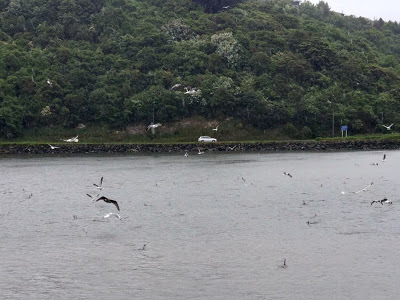 Shags and gulls, Andersons Bay inletThe raw materials of a short story set on the Andersons Bay inlet and adjacent playing fields are slowly gathering. I seem to add to the store every time I bike passed.
Shags and gulls, Andersons Bay inletThe raw materials of a short story set on the Andersons Bay inlet and adjacent playing fields are slowly gathering. I seem to add to the store every time I bike passed.
Birds play a big part in this not-yet-story. There's a grandson and his grandpa. And the grandson twenty years later watching his son play cricket, which is to say, not really watching his son play cricket. And birds. Did I mention birds?
The photo above was taken on a cold and rainy day last fornight. It was rare on that account (the weather last week was AMAZING, and though the temperatures have tailed off since Friday, it's still been suitable for outdoor adventures). And perhaps because of the weird, icy late October downpour, the inlet was alive with dozens (possible more than 100??) shags and a similar number of gulls (both black-backed and the smaller red-billed). Based on the group feeding and appearance, I'm 90% sure the shags were Otago aka Stewart Island Shags, most likely from the population that breeds at Harrington Point. They're stunning birds and seeing that many after some kind of feed in the inlet, and being pestered by the gulls, was quite a sight.
My tally of other species seen on or around the inlet in recent weeks includes: grey duck/mallard hybrid with nine ducklings, paradise shelduck, royal spoonbills (up to half a dozen at one), white heron, white-faced heron, white-fronted terns, sparrows, chaffinch, goldfinch, blackbirds, starlings, variable oystercatcher, spotted and little shags (far more common than the Otago shags).
Completists only
The video from the Meet the Fellows Event in August is now on YouTube.
Or you could go for a walk!
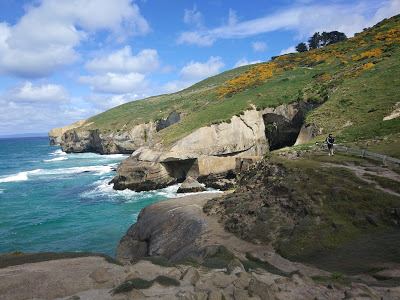 Tunnel Beach<!-- /* Font Definitions */ @font-face {font-family:"Cambria Math"; panose-1:2 4 5 3 5 4 6 3 2 4; mso-font-charset:0; mso-generic-font-family:auto; mso-font-pitch:variable; mso-font-signature:-536870145 1107305727 0 0 415 0;} @font-face {font-family:Calibri; panose-1:2 15 5 2 2 2 4 3 2 4; mso-font-charset:0; mso-generic-font-family:auto; mso-font-pitch:variable; mso-font-signature:-536870145 1073786111 1 0 415 0;} /* Style Definitions */ p.MsoNormal, li.MsoNormal, div.MsoNormal {mso-style-unhide:no; mso-style-qformat:yes; mso-style-parent:""; margin:0cm; margin-bottom:.0001pt; mso-pagination:widow-orphan; font-size:12.0pt; font-family:Calibri; mso-ascii-font-family:Calibri; mso-ascii-theme-font:minor-latin; mso-fareast-font-family:Calibri; mso-fareast-theme-font:minor-latin; mso-hansi-font-family:Calibri; mso-hansi-theme-font:minor-latin; mso-bidi-font-family:"Times New Roman"; mso-bidi-theme-font:minor-bidi; mso-fareast-language:EN-US;} a:link, span.MsoHyperlink {mso-style-priority:99; color:#0563C1; mso-themecolor:hyperlink; text-decoration:underline; text-underline:single;} a:visited, span.MsoHyperlinkFollowed {mso-style-noshow:yes; mso-style-priority:99; color:#954F72; mso-themecolor:followedhyperlink; text-decoration:underline; text-underline:single;} .MsoChpDefault {mso-style-type:export-only; mso-default-props:yes; font-family:Calibri; mso-ascii-font-family:Calibri; mso-ascii-theme-font:minor-latin; mso-fareast-font-family:Calibri; mso-fareast-theme-font:minor-latin; mso-hansi-font-family:Calibri; mso-hansi-theme-font:minor-latin; mso-bidi-font-family:"Times New Roman"; mso-bidi-theme-font:minor-bidi; mso-fareast-language:EN-US;} @page WordSection1 {size:595.0pt 842.0pt; margin:72.0pt 72.0pt 72.0pt 72.0pt; mso-header-margin:35.4pt; mso-footer-margin:35.4pt; mso-paper-source:0;} div.WordSection1 {page:WordSection1;} </style> -->
Tunnel Beach<!-- /* Font Definitions */ @font-face {font-family:"Cambria Math"; panose-1:2 4 5 3 5 4 6 3 2 4; mso-font-charset:0; mso-generic-font-family:auto; mso-font-pitch:variable; mso-font-signature:-536870145 1107305727 0 0 415 0;} @font-face {font-family:Calibri; panose-1:2 15 5 2 2 2 4 3 2 4; mso-font-charset:0; mso-generic-font-family:auto; mso-font-pitch:variable; mso-font-signature:-536870145 1073786111 1 0 415 0;} /* Style Definitions */ p.MsoNormal, li.MsoNormal, div.MsoNormal {mso-style-unhide:no; mso-style-qformat:yes; mso-style-parent:""; margin:0cm; margin-bottom:.0001pt; mso-pagination:widow-orphan; font-size:12.0pt; font-family:Calibri; mso-ascii-font-family:Calibri; mso-ascii-theme-font:minor-latin; mso-fareast-font-family:Calibri; mso-fareast-theme-font:minor-latin; mso-hansi-font-family:Calibri; mso-hansi-theme-font:minor-latin; mso-bidi-font-family:"Times New Roman"; mso-bidi-theme-font:minor-bidi; mso-fareast-language:EN-US;} a:link, span.MsoHyperlink {mso-style-priority:99; color:#0563C1; mso-themecolor:hyperlink; text-decoration:underline; text-underline:single;} a:visited, span.MsoHyperlinkFollowed {mso-style-noshow:yes; mso-style-priority:99; color:#954F72; mso-themecolor:followedhyperlink; text-decoration:underline; text-underline:single;} .MsoChpDefault {mso-style-type:export-only; mso-default-props:yes; font-family:Calibri; mso-ascii-font-family:Calibri; mso-ascii-theme-font:minor-latin; mso-fareast-font-family:Calibri; mso-fareast-theme-font:minor-latin; mso-hansi-font-family:Calibri; mso-hansi-theme-font:minor-latin; mso-bidi-font-family:"Times New Roman"; mso-bidi-theme-font:minor-bidi; mso-fareast-language:EN-US;} @page WordSection1 {size:595.0pt 842.0pt; margin:72.0pt 72.0pt 72.0pt 72.0pt; mso-header-margin:35.4pt; mso-footer-margin:35.4pt; mso-paper-source:0;} div.WordSection1 {page:WordSection1;} </style> -->
Better to open with Dunedin and its surrounds!
All photos from the last fortnight.
 Yellowhammer in the gorse, Tunnel Beach
Yellowhammer in the gorse, Tunnel Beach Fur Seal, Aramoana
Fur Seal, Aramoana
 Sheep, blocking the way to Cape Saunders, Otago Peninsula
Sheep, blocking the way to Cape Saunders, Otago Peninsula(no metaphor intended)
Fortnight 20 wordcountsTotal words: 11,034 (60% on the novel, 26% on this blog, 14% on other non-fiction)1st week: 5,5242nd week: 5,510
Two equally disappointing weeks, symptomatic of the slough I’m in with the novel. For weeks I’d persisted in moving forward, trying to get a first draft done before Christmas, but as the section in San Marino continued to grow, I could feel the tension and interest (mine and the imagined reader’s) trickling away. Something was wrong back at the beginning of the Italian section, but I wasn’t sure what.
So I printed out the 84,000 words I had and read through from the beginning.
Last time I did this (about two months ago), I was pleasantly surprised how much fun it was to read. This time, the first section remained unproblematic, but the laws of diminishing marginal returns had sapped the fun from it.
I managed to find a number of things at the start of the second section that were sapping the potential of the later chapters (and promised to unbalance the whole shebang).
As always, it boils down to a protagonist being too passive, or his/her intention not being clear enough or believable.
I’m in the midst of rewriting these early chapters now and the process will take weeks for me to get back to where I was mid-October.
It’s a pain in the butt, but I think it’s far more efficient to do this work now than keep rambling toward an unsatisfying and ultimately arbitrary finish line.
As for the ending of the book, I see that quite clearly (it’s a shorter section, maybe 10k words, set two years ahead of the rest of the novel) and it hasn’t changed since I dreamed it up back in July.
So it’s really just the large middle section that’s causing all the problems. But nothing is fatal.
Just more work/rework/binning/recycling.
Onward!
 Hoopers Inlet, the peninsulaShort Story Club
Hoopers Inlet, the peninsulaShort Story ClubLast Thursday, my short story, ‘Manawatu’ was discussed as part of Jesse Mulligan’s Short Story Club on Radio NZ National.
From the files I have with me in Dunedin, I can only ascertain that I wrote the story before July 2008 (when I submitted it to Sport). I’m pretty sure this is one of two stories in A Man Melting that I wrote before I did my MA in 2006 (the other being ‘The Tin Man’, though it had a different title). Around the same time, I moved from Hotmail to Gmail, so the trail goes cold in my online archives then, too.
Anyway, I’m pretty sure ‘Manawatu’ is it at least 10 years old. It definitely bears the marks of being written while I lived in Australia (and by an angst-ridden twenty-something).
Re-reading it now, and hearing it be discussed, I’m pleased with how it goes about its business (that very interior, very analytical beginning, carried on to the point it feels confronting, to then have some external action, which is only fully explained when the interior is understood). Not bad for someone a year or two older than the protagonist.
It’s the story I’ve thought about the most this year while writing my location scouting/levitation novel. In part it’s to do with the incredibly close 3rdperson narration, and in part the fact my protagonist is a year or two younger than me and there’s that tension between loading him up with autobiographical elements and letting him realise his true (and truly different from me) character.
So ten or twelve years or whatever it is later, I’m back where I began, angst-ridden and uncertain.
Yep, feels about right.
 Mist on the water, Kaikorai EstuaryCreative Cities Southern Hui
Mist on the water, Kaikorai EstuaryCreative Cities Southern HuiI was on RNZ National myself on Sunday, along with Nicky Page, to spruik the Creative Cities Southern Hui which takes place in Dunedin at the end of the month.
Details about the hui here. (It’s a pretty cool lineup when I follow [alphabetically at least], Hera Lindsay Bird and Shayne Carter).
And on my bio page for the hui (and in the radio interview above) I hint at what I’ll talk about. For now the working title is: ‘We are all storyteller: analogue and digital perspectives on narrative’. It basically takes some of the deep thinking I’ve been doing about NBA 2K18 and similar games, and looks at the crossover between writers/readers and game designers/players, and what we could learn from each other.
For the birds
 Shags and gulls, Andersons Bay inletThe raw materials of a short story set on the Andersons Bay inlet and adjacent playing fields are slowly gathering. I seem to add to the store every time I bike passed.
Shags and gulls, Andersons Bay inletThe raw materials of a short story set on the Andersons Bay inlet and adjacent playing fields are slowly gathering. I seem to add to the store every time I bike passed.Birds play a big part in this not-yet-story. There's a grandson and his grandpa. And the grandson twenty years later watching his son play cricket, which is to say, not really watching his son play cricket. And birds. Did I mention birds?
The photo above was taken on a cold and rainy day last fornight. It was rare on that account (the weather last week was AMAZING, and though the temperatures have tailed off since Friday, it's still been suitable for outdoor adventures). And perhaps because of the weird, icy late October downpour, the inlet was alive with dozens (possible more than 100??) shags and a similar number of gulls (both black-backed and the smaller red-billed). Based on the group feeding and appearance, I'm 90% sure the shags were Otago aka Stewart Island Shags, most likely from the population that breeds at Harrington Point. They're stunning birds and seeing that many after some kind of feed in the inlet, and being pestered by the gulls, was quite a sight.
My tally of other species seen on or around the inlet in recent weeks includes: grey duck/mallard hybrid with nine ducklings, paradise shelduck, royal spoonbills (up to half a dozen at one), white heron, white-faced heron, white-fronted terns, sparrows, chaffinch, goldfinch, blackbirds, starlings, variable oystercatcher, spotted and little shags (far more common than the Otago shags).
Completists only
The video from the Meet the Fellows Event in August is now on YouTube.
Or you could go for a walk!
 Tunnel Beach<!-- /* Font Definitions */ @font-face {font-family:"Cambria Math"; panose-1:2 4 5 3 5 4 6 3 2 4; mso-font-charset:0; mso-generic-font-family:auto; mso-font-pitch:variable; mso-font-signature:-536870145 1107305727 0 0 415 0;} @font-face {font-family:Calibri; panose-1:2 15 5 2 2 2 4 3 2 4; mso-font-charset:0; mso-generic-font-family:auto; mso-font-pitch:variable; mso-font-signature:-536870145 1073786111 1 0 415 0;} /* Style Definitions */ p.MsoNormal, li.MsoNormal, div.MsoNormal {mso-style-unhide:no; mso-style-qformat:yes; mso-style-parent:""; margin:0cm; margin-bottom:.0001pt; mso-pagination:widow-orphan; font-size:12.0pt; font-family:Calibri; mso-ascii-font-family:Calibri; mso-ascii-theme-font:minor-latin; mso-fareast-font-family:Calibri; mso-fareast-theme-font:minor-latin; mso-hansi-font-family:Calibri; mso-hansi-theme-font:minor-latin; mso-bidi-font-family:"Times New Roman"; mso-bidi-theme-font:minor-bidi; mso-fareast-language:EN-US;} a:link, span.MsoHyperlink {mso-style-priority:99; color:#0563C1; mso-themecolor:hyperlink; text-decoration:underline; text-underline:single;} a:visited, span.MsoHyperlinkFollowed {mso-style-noshow:yes; mso-style-priority:99; color:#954F72; mso-themecolor:followedhyperlink; text-decoration:underline; text-underline:single;} .MsoChpDefault {mso-style-type:export-only; mso-default-props:yes; font-family:Calibri; mso-ascii-font-family:Calibri; mso-ascii-theme-font:minor-latin; mso-fareast-font-family:Calibri; mso-fareast-theme-font:minor-latin; mso-hansi-font-family:Calibri; mso-hansi-theme-font:minor-latin; mso-bidi-font-family:"Times New Roman"; mso-bidi-theme-font:minor-bidi; mso-fareast-language:EN-US;} @page WordSection1 {size:595.0pt 842.0pt; margin:72.0pt 72.0pt 72.0pt 72.0pt; mso-header-margin:35.4pt; mso-footer-margin:35.4pt; mso-paper-source:0;} div.WordSection1 {page:WordSection1;} </style> -->
Tunnel Beach<!-- /* Font Definitions */ @font-face {font-family:"Cambria Math"; panose-1:2 4 5 3 5 4 6 3 2 4; mso-font-charset:0; mso-generic-font-family:auto; mso-font-pitch:variable; mso-font-signature:-536870145 1107305727 0 0 415 0;} @font-face {font-family:Calibri; panose-1:2 15 5 2 2 2 4 3 2 4; mso-font-charset:0; mso-generic-font-family:auto; mso-font-pitch:variable; mso-font-signature:-536870145 1073786111 1 0 415 0;} /* Style Definitions */ p.MsoNormal, li.MsoNormal, div.MsoNormal {mso-style-unhide:no; mso-style-qformat:yes; mso-style-parent:""; margin:0cm; margin-bottom:.0001pt; mso-pagination:widow-orphan; font-size:12.0pt; font-family:Calibri; mso-ascii-font-family:Calibri; mso-ascii-theme-font:minor-latin; mso-fareast-font-family:Calibri; mso-fareast-theme-font:minor-latin; mso-hansi-font-family:Calibri; mso-hansi-theme-font:minor-latin; mso-bidi-font-family:"Times New Roman"; mso-bidi-theme-font:minor-bidi; mso-fareast-language:EN-US;} a:link, span.MsoHyperlink {mso-style-priority:99; color:#0563C1; mso-themecolor:hyperlink; text-decoration:underline; text-underline:single;} a:visited, span.MsoHyperlinkFollowed {mso-style-noshow:yes; mso-style-priority:99; color:#954F72; mso-themecolor:followedhyperlink; text-decoration:underline; text-underline:single;} .MsoChpDefault {mso-style-type:export-only; mso-default-props:yes; font-family:Calibri; mso-ascii-font-family:Calibri; mso-ascii-theme-font:minor-latin; mso-fareast-font-family:Calibri; mso-fareast-theme-font:minor-latin; mso-hansi-font-family:Calibri; mso-hansi-theme-font:minor-latin; mso-bidi-font-family:"Times New Roman"; mso-bidi-theme-font:minor-bidi; mso-fareast-language:EN-US;} @page WordSection1 {size:595.0pt 842.0pt; margin:72.0pt 72.0pt 72.0pt 72.0pt; mso-header-margin:35.4pt; mso-footer-margin:35.4pt; mso-paper-source:0;} div.WordSection1 {page:WordSection1;} </style> -->
Published on November 06, 2017 16:59
November 1, 2017
October Consumption Diary
MUSIC
While I read nine books in October, music was the real highlight. Without a consistently compelling 'Working' playlist, a mix of old and new, upbeat and down, I'm not sure I would have spent half as much time plugging away at my novel, especially with the heatwave we've been having this week.
BOOKS
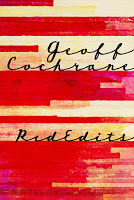 RedEdits by Geoff Cochrane (poetry, NZ)
RedEdits by Geoff Cochrane (poetry, NZ)
Yay.
Ever since I read all of GC’s poetry collection in existence when living in Edinburgh ten years ago, two years has felt a long time to wait for a new book.
Then again, it’s kind of amazing GC is putting out collections every two years (both on demand and supply sides of the equation). Fanfolks like me are the beneficiaries of this universal oversight, so let us not speak too loudly of this.
Diesel Mystic by Gregory O’Brien (novel, NZ)
 I hunted down a copy of this book after I read about how it featured two churches on either side of the road who competed for believers by publishing ever more exaggerated bios of saints on their feast days, including one St Joseph of Copertino. Turns out, this takes up all of four pages (it’s fun while it lasts!).
I hunted down a copy of this book after I read about how it featured two churches on either side of the road who competed for believers by publishing ever more exaggerated bios of saints on their feast days, including one St Joseph of Copertino. Turns out, this takes up all of four pages (it’s fun while it lasts!).
Over the thin narrative skeleton (a young guy is driving back and forth between Dargaville and Ruawai) O’Brien throws dozens of prose flights of fancy, some poems, some monochrome paintings and even some painted poems.
Some of it is great (the feral kids in among the carbodies who lock a policeman in a trunk; the rival churches); a lot of it washed right over me.
(Rather than making me want to write a novel like this, it just made me hanker to write short (and very short) stories again, or be at that point where I can piece together a new collection.)[image error]
Oh, and I’m totally jealous of that title.
I, The Jury by Mickey Spillane (novel, audiobook)
[image error] Mike Hammer, eh?
My first Spillane novel. It’s so stark, in terms of style and substance. No wonder it’s over so quickly.
It’s always hard to judge crime fiction from an earlier era (this is set just after WWII), especially from writers that later writers in that genre have read and admired (not to mention people behind films and TV shows). So I guessed the twist by the midpoint? Big whoop. Would I have done that in the fifties? Who knows?
Will I read another one? Maybe not.
[image error] Nicotine by Nell Zink (novel, audiobook)
[image error]This one never clicked for me.
Zink is doing a very deliberate, very cool, disconnected narrative voice thing. Which can work if the subject matter is strong enough to pull me in, but I never really go the answer to So What?
Maybe this was a case of racing through it in audiobook form not really being the right vehicle for the work?
How to Stop time by Matt Haig (novel, e-book)
[image error] I read this as an e-book on my phone, which is a first. Again, maybe this was not the best way to do it (and maybe I'm just projecting my own misery re: my cockamamie novel-in-progress), so take this with a megabyte of salt.
I first came across Haig as a writer of massively retweeted tweets. Then read a few of his longer thinkpieces in The Guardian. But I’d never read any of his novels.
How to Stop Time is high concept, alright: the narrator has a genetic condition which means he ages far more slowly after reaching puberty than the rest of us. He was born in the 1500s but looks in his early forties in the present day.
The problem is the book never really gets out of blocks in terms of developing character or forward momentum. Or maybe the problem was the writing felt so facile? He does use italics a lot. I mean, a lot.
Compare this with David Mitchell’s The Bone Clocks (which I didn't love), which also features long-lived others. Mitchell is always prone to over-doing it (whether that’s narrative shifts, verbal pyrotechnics or mystical underpinning), but after reading Haig, I think that’s preferable to workmanlike execution.
But again, grain of salt![image error][image error]
Autumn by Ali Smith (novel, e-book)
[image error]
The second book I read on my phone, and hey, this was great. Better than Lincoln in the Bardo (sorry Booker judges).
Smith’s staccato prose and frequent paragraph breaks really suited the format. And it felt right (in an oh-so-wrong way) to be reading a post-Brexit novel on a phone. That early scene in the post office, trying to get a passport renewal form pre-checked, sheesh!
I also have a copy of Knausgaard’s Autumn (like, an actual, physical, real life book) on my to read pile. Both authors are working on seasonal quartets (though given the translation lag, I think Knausgaard started first and is further ahead). We’ll see who does it best in about four years.
And you know what they say in Autumn? Winter is coming (sorry)...[image error]
A Game of Thrones (part one) by George RR Martin (novel, audiobook)
[image error] This seventeen hour audiobook is only half of the first book in the Song of Fire and Ice saga, but I’m counting it as a book in its own right. (I have part two on reserve, so should knock that of sometime in November).
I once tried to read this book on a plane. Someone lent me their copy. I got about fifty pages in: so far, so much like the show. After the flight, I never felt compelled to go back to the books.
But with the TV show wrapping up sometime in the next two years, and a steady dose of book-only content from The Ringer’s 'Talk the Thrones', I thought I’d try listen to the first book.
And it took some getting over that first hump again. The déjà vu was hard to kick. So was the very Swords and (suppressed for now) Sorcery feel of Martin’s prose. But then it clicked and I listened solidly and knocked the thing off in four days.
It was nice to jump around and inhabit different perspectives. And the novel was able to work the historical information into the flow of the story better than the TV shows (where it’s either signposted to hell or breezed over so that only book-readers would get it).[image error]
So yeah, bring on the gazillion other hours of audio that remains in the (incomplete) saga.
Bark by Lorrie Moore (short stories, audiobook)
[image error] I'd read/heard the first story before, and the second, and the third. I knew for sure this last one had been discussed by Gary Shteyngart on The New Yorker Fiction Podcast, and guessed I'd read the others in the The New Yorker (or heard them on the author's voice podcast). But there was that nagging feeling I was having one of those ‘Oh, I’ve seen/read this before’ moments that parents have an impossibly long way into a movie/book, and as a young’un, you’re like, That’d never happen to me…
To have this happen to me now, at 34 (albeit technically a parent), is kind of terrifying.
(And Moore is terrifying for other reasons, as a writer reading her. Especially someone mired in the second half of a novel that feels too boring and procedural, and would give anything to just riff the way Moore’s characters do, except Moore’s able to make it all stick together.)
But story number four didn't ring any bells, so I was safe.
I mean, I love Lorrie Moore. Her stories especially. I’d remember reading a whole collection, wouldn’t I?
Then the last story was familiar too, but only when the bikers showed up at the wrong wedding. So I'd forgotten the non-memorable parts of a standalone story I'd read a couple of years ago. Big deal.
But that lingering dread! The terror of turning into my mother / step-dad / father-in-law (now there's a fearsome-yet-forgetful troika).
So I search my own blog (!) and found that, yes, I had listened to this entire collection back in 2014 (!!!) when the book came out, and wrote about it disparagingly (!!!):
Not only had I consumed the same audiobook twice without cottoning on to it, I'd come out the other end with different opinions each time. Maybe this isn't a big surprise. (Any writers I've slagged off above, you can take solace in this fact... maybe in three years I'll totally love your book).
At the risk of further providing evidence for whoever holds my power of attorney and wants to send me to the looney bin and claim my millions (ha!), this time around, when I thought I was listening to the collection for the first time but in some cases it was the third time I’d heard individual stories, I thought it did hang together and it was great. GREAT.[image error]
As for the state of my memory… less great.
Sheesh.
Manhattan Beach by Jennifer Egan (novel, audiobook)
[image error] This book just came out, so I’m confident this was my first time reading it (phew).
This profile in The New Yorker was interesting and confirms a lot of what I surmised, like:
The shipwreck/lifeboat survival sequence was really well handled, and there’s some real subtlety in terms of the structure (like the presence/absence of Anna’s father and Dexter, her father-proxy/lover), but it never took that next step from being highly proficient to become enjoyable or challenging or fresh.
MOVIES/TV
High and Low & The Hidden Fortress – the start of my wife’s Kurosawa education
La Strada - the start of my Fellini education
Spectre (James Bond, yawn)
Rick and Morty, Season 3
Stranger Things, Season 2 (incomplete, possibly permanently)
Spirit: Stallion of the Cimarron about a million times and Spirit: Riding Free, Season 1 about five times through (my son’s into horses at the moment)
While I read nine books in October, music was the real highlight. Without a consistently compelling 'Working' playlist, a mix of old and new, upbeat and down, I'm not sure I would have spent half as much time plugging away at my novel, especially with the heatwave we've been having this week.
BOOKS
 RedEdits by Geoff Cochrane (poetry, NZ)
RedEdits by Geoff Cochrane (poetry, NZ)Yay.
Ever since I read all of GC’s poetry collection in existence when living in Edinburgh ten years ago, two years has felt a long time to wait for a new book.
Then again, it’s kind of amazing GC is putting out collections every two years (both on demand and supply sides of the equation). Fanfolks like me are the beneficiaries of this universal oversight, so let us not speak too loudly of this.
Diesel Mystic by Gregory O’Brien (novel, NZ)
 I hunted down a copy of this book after I read about how it featured two churches on either side of the road who competed for believers by publishing ever more exaggerated bios of saints on their feast days, including one St Joseph of Copertino. Turns out, this takes up all of four pages (it’s fun while it lasts!).
I hunted down a copy of this book after I read about how it featured two churches on either side of the road who competed for believers by publishing ever more exaggerated bios of saints on their feast days, including one St Joseph of Copertino. Turns out, this takes up all of four pages (it’s fun while it lasts!).Over the thin narrative skeleton (a young guy is driving back and forth between Dargaville and Ruawai) O’Brien throws dozens of prose flights of fancy, some poems, some monochrome paintings and even some painted poems.
Some of it is great (the feral kids in among the carbodies who lock a policeman in a trunk; the rival churches); a lot of it washed right over me.
(Rather than making me want to write a novel like this, it just made me hanker to write short (and very short) stories again, or be at that point where I can piece together a new collection.)[image error]
Oh, and I’m totally jealous of that title.
I, The Jury by Mickey Spillane (novel, audiobook)
[image error] Mike Hammer, eh?
My first Spillane novel. It’s so stark, in terms of style and substance. No wonder it’s over so quickly.
It’s always hard to judge crime fiction from an earlier era (this is set just after WWII), especially from writers that later writers in that genre have read and admired (not to mention people behind films and TV shows). So I guessed the twist by the midpoint? Big whoop. Would I have done that in the fifties? Who knows?
Will I read another one? Maybe not.
[image error] Nicotine by Nell Zink (novel, audiobook)
[image error]This one never clicked for me.
Zink is doing a very deliberate, very cool, disconnected narrative voice thing. Which can work if the subject matter is strong enough to pull me in, but I never really go the answer to So What?
Maybe this was a case of racing through it in audiobook form not really being the right vehicle for the work?
How to Stop time by Matt Haig (novel, e-book)
[image error] I read this as an e-book on my phone, which is a first. Again, maybe this was not the best way to do it (and maybe I'm just projecting my own misery re: my cockamamie novel-in-progress), so take this with a megabyte of salt.
I first came across Haig as a writer of massively retweeted tweets. Then read a few of his longer thinkpieces in The Guardian. But I’d never read any of his novels.
How to Stop Time is high concept, alright: the narrator has a genetic condition which means he ages far more slowly after reaching puberty than the rest of us. He was born in the 1500s but looks in his early forties in the present day.
The problem is the book never really gets out of blocks in terms of developing character or forward momentum. Or maybe the problem was the writing felt so facile? He does use italics a lot. I mean, a lot.
Compare this with David Mitchell’s The Bone Clocks (which I didn't love), which also features long-lived others. Mitchell is always prone to over-doing it (whether that’s narrative shifts, verbal pyrotechnics or mystical underpinning), but after reading Haig, I think that’s preferable to workmanlike execution.
But again, grain of salt![image error][image error]
Autumn by Ali Smith (novel, e-book)
[image error]
The second book I read on my phone, and hey, this was great. Better than Lincoln in the Bardo (sorry Booker judges).
Smith’s staccato prose and frequent paragraph breaks really suited the format. And it felt right (in an oh-so-wrong way) to be reading a post-Brexit novel on a phone. That early scene in the post office, trying to get a passport renewal form pre-checked, sheesh!
I also have a copy of Knausgaard’s Autumn (like, an actual, physical, real life book) on my to read pile. Both authors are working on seasonal quartets (though given the translation lag, I think Knausgaard started first and is further ahead). We’ll see who does it best in about four years.
And you know what they say in Autumn? Winter is coming (sorry)...[image error]
A Game of Thrones (part one) by George RR Martin (novel, audiobook)
[image error] This seventeen hour audiobook is only half of the first book in the Song of Fire and Ice saga, but I’m counting it as a book in its own right. (I have part two on reserve, so should knock that of sometime in November).
I once tried to read this book on a plane. Someone lent me their copy. I got about fifty pages in: so far, so much like the show. After the flight, I never felt compelled to go back to the books.
But with the TV show wrapping up sometime in the next two years, and a steady dose of book-only content from The Ringer’s 'Talk the Thrones', I thought I’d try listen to the first book.
And it took some getting over that first hump again. The déjà vu was hard to kick. So was the very Swords and (suppressed for now) Sorcery feel of Martin’s prose. But then it clicked and I listened solidly and knocked the thing off in four days.
It was nice to jump around and inhabit different perspectives. And the novel was able to work the historical information into the flow of the story better than the TV shows (where it’s either signposted to hell or breezed over so that only book-readers would get it).[image error]
So yeah, bring on the gazillion other hours of audio that remains in the (incomplete) saga.
Bark by Lorrie Moore (short stories, audiobook)
[image error] I'd read/heard the first story before, and the second, and the third. I knew for sure this last one had been discussed by Gary Shteyngart on The New Yorker Fiction Podcast, and guessed I'd read the others in the The New Yorker (or heard them on the author's voice podcast). But there was that nagging feeling I was having one of those ‘Oh, I’ve seen/read this before’ moments that parents have an impossibly long way into a movie/book, and as a young’un, you’re like, That’d never happen to me…
To have this happen to me now, at 34 (albeit technically a parent), is kind of terrifying.
(And Moore is terrifying for other reasons, as a writer reading her. Especially someone mired in the second half of a novel that feels too boring and procedural, and would give anything to just riff the way Moore’s characters do, except Moore’s able to make it all stick together.)
But story number four didn't ring any bells, so I was safe.
I mean, I love Lorrie Moore. Her stories especially. I’d remember reading a whole collection, wouldn’t I?
Then the last story was familiar too, but only when the bikers showed up at the wrong wedding. So I'd forgotten the non-memorable parts of a standalone story I'd read a couple of years ago. Big deal.
But that lingering dread! The terror of turning into my mother / step-dad / father-in-law (now there's a fearsome-yet-forgetful troika).
So I search my own blog (!) and found that, yes, I had listened to this entire collection back in 2014 (!!!) when the book came out, and wrote about it disparagingly (!!!):
… I felt the collection was uneven. The stories themselves shifted between classic Moore sardonics and a kind of creative writing student's knock-off version of Moore sardonics.
Not only had I consumed the same audiobook twice without cottoning on to it, I'd come out the other end with different opinions each time. Maybe this isn't a big surprise. (Any writers I've slagged off above, you can take solace in this fact... maybe in three years I'll totally love your book).
At the risk of further providing evidence for whoever holds my power of attorney and wants to send me to the looney bin and claim my millions (ha!), this time around, when I thought I was listening to the collection for the first time but in some cases it was the third time I’d heard individual stories, I thought it did hang together and it was great. GREAT.[image error]
As for the state of my memory… less great.
Sheesh.
Manhattan Beach by Jennifer Egan (novel, audiobook)
[image error] This book just came out, so I’m confident this was my first time reading it (phew).
This profile in The New Yorker was interesting and confirms a lot of what I surmised, like:
The novel is a conventionally structured work of historical fiction set in Brooklyn during the nineteen-thirties and forties, a period that she became curious about in the wake of 9/11. The attacks felt like the end of something—the United States’ sense of itself as king of the world, snug in its supremacy. “And that led me to think, Well, what was the beginning of that something?” she said. “Somehow it felt like it was World War Two, this violent conflict in which we played a critical but relatively small part in such a way that it left us quite unscathed and tremendously dominant.”While this might seem fascinating for Americans, it can feel very insular for those of us elsewhere.
The shipwreck/lifeboat survival sequence was really well handled, and there’s some real subtlety in terms of the structure (like the presence/absence of Anna’s father and Dexter, her father-proxy/lover), but it never took that next step from being highly proficient to become enjoyable or challenging or fresh.
MOVIES/TV
High and Low & The Hidden Fortress – the start of my wife’s Kurosawa education
La Strada - the start of my Fellini education
Spectre (James Bond, yawn)
Rick and Morty, Season 3
Stranger Things, Season 2 (incomplete, possibly permanently)
Spirit: Stallion of the Cimarron about a million times and Spirit: Riding Free, Season 1 about five times through (my son’s into horses at the moment)
Published on November 01, 2017 00:36
October 23, 2017
Fortnight 19 of the Burns
Fortnight 19 summary
Total wordcount: 14,660 (65% on the novel, 29% essays, 3% on the blog and 3% on poetry)
1st week: 9,251
2nd week: 5,409
That Thursday (19 October)
1)
I woke to news that Gord Downie had passed away.
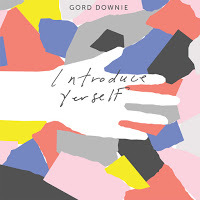
I wrote about Gord's brain cancer and The Hip most recently in my April Consumption Diary. It's the tip of the iceberg, really. The Tragically Hip have been an obsession of mine for the last 15 years; their music has underwritten so much of my creativity over that time.
One nice thing: Gord managed one last album (a double LP called Introduce Yerself) which comes out on the 27th of October. I'm working on something to accompany the album dropping, and hopefully it'll find a home somewhere online...
2)
The fates (or the editors of the Otago Daily Times) chose that same day for the publication of my profile in the local paper, a full two months after the interview and (very brief) photo shoot.
(I'm so over thinking about my writing (and being written about) in terms of juggling paid employment, family and writing. One of the great things about this year is writing and money have been pretty well merged. But IT IS temporary. So I guess I'll just have to run the risk of looking like a part-timer until I have another book to speak on my behalf.)
3)
In the afternoon, the Sacramento Kings played their first game of the new NBA season. There are zero expectations in terms of winning or the playoffs for the squad this year, but half the roster have one or fewer years experience in the NBA, and it's going to be fascinating how the young guys develop.
Against Houston, they delivered the expected 'L', but the game was great to watch and the young guys who made it onto the court played well. I noted in Fortnight 11 that I was sceptical about D'Aaron Fox, but so far he's proving me wrong.
4)
I went to a talk at 5:15pm on 'Fake Religions, Fake News and the Allure of Fiction', by Carole M Cusack from the Universtiy of Sydney. As I'm writing a book that features a fictional cult (which touches on but is not the sole representation of a kind of alternative spirituality), this was very timely.
After a bit of academic calisthenics, Cusack provided an interesting survey of new religions that have appeared since the 1960s, predominantly those inspired by works of fiction (the Church of All Worlds, Jediism, Matrixism, Dudeism, Bronies, etc).
It was fascinating, if a little superficial (such is the nature of surveying such a proliferation of movements in an hour).
During the Q&A, Cusack mentioned the 4 million Americans who claim to have been abducted by aliens, and how she was looking into ufology: was there something in it, or was it a case of cascading mindsets?
I probably asked questions in about 2% of Q&As I attend - I just don't think of questions, and if I do, they're so niche I feel no one else would benefit from hearing the answer. But in this case, surrounded by a lot of Religious Studies academics and students, the whole talk was probably too niche, so I thought what the hey.
I asked what is it about new age, syncretic religions, like Damanhur in Turin (and now elsewhere), that do a really good job of selecting good aspects from the religious pick'n'mix that's available to them, but then they go and overreach by believing in something like UFOs or, in the case of Damanhur, time travel? Is it that they feel that to be a religion they need something beyond human comprehension? Or is it, more cynically, a marketing thing: to cut through the noise of the other movements, they need something to hang their hat on?
Both were likely, according to Cusack, who also noted that in many countries, in order to be acknowledged as a religion (and thus receive favourable treatment in terms of tax etc) the legal process definitely privileges those with out-there beliefs.
5)
When I got home and switched on the news, Winston had finally made up his mind and went with Labour (and, implicitly, The Greens).
My Twitter bubble was going bananas.
It'll certainly be what 19 October 2017 will be most remembered for around these parts... But my wife told me Downie's passing was on the list of most read articles on Stuff.co.nz earlier in the day, and I'll cling to that.
Tales of Chip Pnini
The week previous, The Spinoff published my piece called: 'Everything wrong with NBA 2K18’s MyCareer mode and one possible solution'. It doesn't cover everything, but it gives you a good idea of my take.
And reader, I'm still playing.
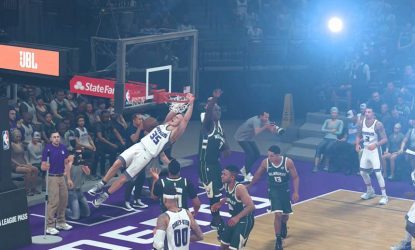
Taieri Gorge Railway
On Saturday, we (wife, two kids and in-laws) went on the Taieri Gorge Railway to Pukerangi, then got a shuttle to Middlemarch, biked the first 5kms of the Central Otago Rail Trail (enough to know it was not enough; but more than enough for the two pre-schoolers).
On Sunday the train ran from Middlemarch, so we caught it back to Dunedin. Another great wee trip. Bless you Otago.
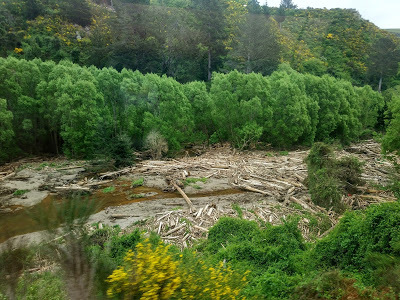 Debris from the flood a couple months back
Debris from the flood a couple months back
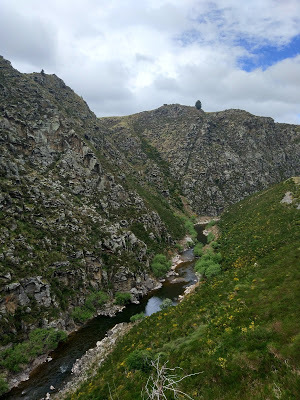
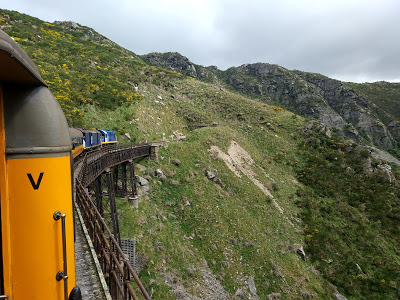
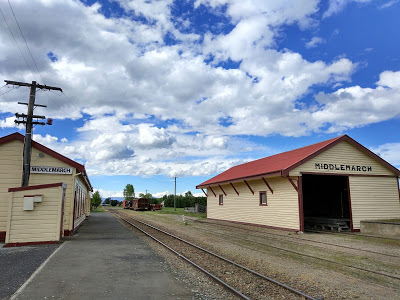
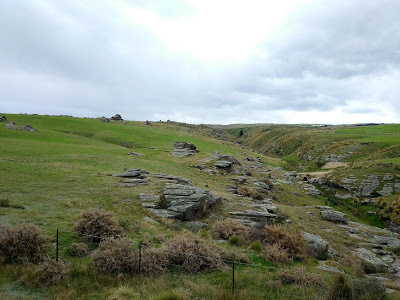

Last for a reason
How's the novel going? Let's just say I read a takedown of Dan Brown's latest book this morning (as if he hadn't been taken down in all the ways you might approach literature a hundred times over; like, the only reason I read it was to see why anyone would go through that effort in 2017, but I'm still none the wiser) and found myself thinking: shit, a reviewer could say these things about MY NOVEL!!
I tell myself that, even if that was true about what on the page (or some of the pages) at the moment, the manuscript exists as an incomplete first draft. I can get rid of the Brownisms and make scenes that aren't working work with a bit of elbow grease on the next go round.
But far out. Can I get to the end of this thing already so I can spend my days making it better rather than making it feel worse?!?!?
Total wordcount: 14,660 (65% on the novel, 29% essays, 3% on the blog and 3% on poetry)
1st week: 9,251
2nd week: 5,409
That Thursday (19 October)
1)
I woke to news that Gord Downie had passed away.

I wrote about Gord's brain cancer and The Hip most recently in my April Consumption Diary. It's the tip of the iceberg, really. The Tragically Hip have been an obsession of mine for the last 15 years; their music has underwritten so much of my creativity over that time.
One nice thing: Gord managed one last album (a double LP called Introduce Yerself) which comes out on the 27th of October. I'm working on something to accompany the album dropping, and hopefully it'll find a home somewhere online...
2)
The fates (or the editors of the Otago Daily Times) chose that same day for the publication of my profile in the local paper, a full two months after the interview and (very brief) photo shoot.
(I'm so over thinking about my writing (and being written about) in terms of juggling paid employment, family and writing. One of the great things about this year is writing and money have been pretty well merged. But IT IS temporary. So I guess I'll just have to run the risk of looking like a part-timer until I have another book to speak on my behalf.)
3)
In the afternoon, the Sacramento Kings played their first game of the new NBA season. There are zero expectations in terms of winning or the playoffs for the squad this year, but half the roster have one or fewer years experience in the NBA, and it's going to be fascinating how the young guys develop.
Against Houston, they delivered the expected 'L', but the game was great to watch and the young guys who made it onto the court played well. I noted in Fortnight 11 that I was sceptical about D'Aaron Fox, but so far he's proving me wrong.
4)
I went to a talk at 5:15pm on 'Fake Religions, Fake News and the Allure of Fiction', by Carole M Cusack from the Universtiy of Sydney. As I'm writing a book that features a fictional cult (which touches on but is not the sole representation of a kind of alternative spirituality), this was very timely.
After a bit of academic calisthenics, Cusack provided an interesting survey of new religions that have appeared since the 1960s, predominantly those inspired by works of fiction (the Church of All Worlds, Jediism, Matrixism, Dudeism, Bronies, etc).
It was fascinating, if a little superficial (such is the nature of surveying such a proliferation of movements in an hour).
During the Q&A, Cusack mentioned the 4 million Americans who claim to have been abducted by aliens, and how she was looking into ufology: was there something in it, or was it a case of cascading mindsets?
I probably asked questions in about 2% of Q&As I attend - I just don't think of questions, and if I do, they're so niche I feel no one else would benefit from hearing the answer. But in this case, surrounded by a lot of Religious Studies academics and students, the whole talk was probably too niche, so I thought what the hey.
I asked what is it about new age, syncretic religions, like Damanhur in Turin (and now elsewhere), that do a really good job of selecting good aspects from the religious pick'n'mix that's available to them, but then they go and overreach by believing in something like UFOs or, in the case of Damanhur, time travel? Is it that they feel that to be a religion they need something beyond human comprehension? Or is it, more cynically, a marketing thing: to cut through the noise of the other movements, they need something to hang their hat on?
Both were likely, according to Cusack, who also noted that in many countries, in order to be acknowledged as a religion (and thus receive favourable treatment in terms of tax etc) the legal process definitely privileges those with out-there beliefs.
5)
When I got home and switched on the news, Winston had finally made up his mind and went with Labour (and, implicitly, The Greens).
My Twitter bubble was going bananas.
It'll certainly be what 19 October 2017 will be most remembered for around these parts... But my wife told me Downie's passing was on the list of most read articles on Stuff.co.nz earlier in the day, and I'll cling to that.
Tales of Chip Pnini
The week previous, The Spinoff published my piece called: 'Everything wrong with NBA 2K18’s MyCareer mode and one possible solution'. It doesn't cover everything, but it gives you a good idea of my take.
And reader, I'm still playing.

Taieri Gorge Railway
On Saturday, we (wife, two kids and in-laws) went on the Taieri Gorge Railway to Pukerangi, then got a shuttle to Middlemarch, biked the first 5kms of the Central Otago Rail Trail (enough to know it was not enough; but more than enough for the two pre-schoolers).
On Sunday the train ran from Middlemarch, so we caught it back to Dunedin. Another great wee trip. Bless you Otago.
 Debris from the flood a couple months back
Debris from the flood a couple months back




Last for a reason
How's the novel going? Let's just say I read a takedown of Dan Brown's latest book this morning (as if he hadn't been taken down in all the ways you might approach literature a hundred times over; like, the only reason I read it was to see why anyone would go through that effort in 2017, but I'm still none the wiser) and found myself thinking: shit, a reviewer could say these things about MY NOVEL!!
I tell myself that, even if that was true about what on the page (or some of the pages) at the moment, the manuscript exists as an incomplete first draft. I can get rid of the Brownisms and make scenes that aren't working work with a bit of elbow grease on the next go round.
But far out. Can I get to the end of this thing already so I can spend my days making it better rather than making it feel worse?!?!?
Published on October 23, 2017 00:35
October 8, 2017
Aloe Veritas: Fortnight 18 of the Burns
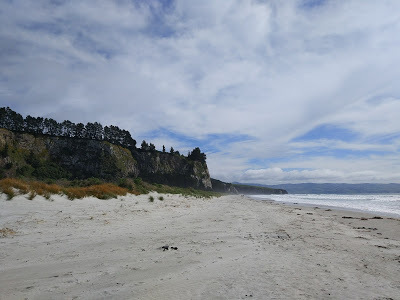 LBNC - Long Beach, not California
LBNC - Long Beach, not California18 is a scarily high number. I mean, there are only 26 fortnights in a year (or as I’ve begun to visualise it, carriages on a gravy train). With late December and most of January’s writing time severely compromised by family time / the dreaded return to Wellington, the last few carriages are about to leave the station!
(We’re going on the Taieri Gorge Railway trip on Labour Weekend, which might explain the trainish bent to my metaphors).
*
Fortnight 18 total words: 11,429 (novel: 72%, blog, 14%, non-fiction: 10%, short stories %4) 1st week: 7,0512nd week: 4,378
*
I went up to Wellington last Tuesday to meet with my boss (and my boss’s boss, quite by chance) to talk about what I do, and how many days/hours I work next year.
I put forward my first and best offer, which should provide an okay balance on income and output (both for my employer and my own writing).
It has yet to be shot down (or accepted).
We shall see.
*
The publication date for the US version of THE MANNEQUIN MAKERS has been pushed back to 12/12/17, which is trickily close to Christmas (not that I’m expecting it to go Danielle Steele) but avoids any confusion between NZ and US readings of the date.
On the positive side, the old battler received a starred review in Publishers Weekly last week. Abridged version:
New Zealander Cliff makes a stunning American debut with a story about obsession gone horribly wrong… [plot description] This is a spellbinding and original tale, rife with perilous journeys, fascinating historical detail, and memorable characters.
As I am in the midst of another novel, it’s hard not to read in some ambiguity in that first sentence (it’s the novelists obsessions that go horribly wrong).
Together with a similarly positive Kirkusreview (“A grim and glorious meditation on the cruelty of fate”), I’ve at least got decent US pull-quotes for my website (when I get around to updating her).
I was approached by an agent in the US who’d read the PW review and wondered if I was working on anything else. So nice to be a cold contactee for once (!) but very early days on that front. Like, maybe I should finish this new fricken novel, eh?
I also carved out time to write an essay about writing THE MANNEQUIN MAKERS (as if I wasn’t self-concerned enough) for my US publishers to pitch to various online outlets.
We shall see what becomes of it.
We. Shall. See.
*
Tourism in Brief
In the middle weekend of Fortnight 18 I took the family (including in-laws) to the Port Chalmers Seafood Festival (worth it) and Long Beach (crib me!).
*
In addition to keeping the novel moving, I’m working on a piece ('essay' seems too hifalutin) about NBA 2k18 (as mentioned in my September consumption diary); I entered the Sunday Times short story comp in the UK with one of the stories I wrote in February; and I’m giving a reading tonight (Monday – technically Fortnight 19’s achievement) at the University Book Store as part of the NZSA’s regular salon.
Published on October 08, 2017 16:27
October 1, 2017
September Consumption Diary
MUSIC
BOOKS
4 3 2 1 by Paul Auster (novel, audiobook)
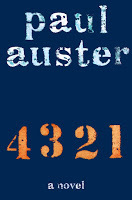 After getting a sixth of the way in (and writing about it in my August consumption diary) I didn’t listen to Auster’s forking doorstop for a week thanks to time in Invercargill and Stewart Island.
After getting a sixth of the way in (and writing about it in my August consumption diary) I didn’t listen to Auster’s forking doorstop for a week thanks to time in Invercargill and Stewart Island.
And it really is the kind of novel you need to read in a sustained burst, as you’re trying to keep four different versions of Fergusson straight in your head.
Auster is pretty good at differentiating Fergusson 1 from Fergussons 2, 3 and 4, not labouring the differences and not being too repetitive, but it’s still a massive undertaking for a reader to keep everything straight in their head.
Especially when Auster’s two key weapons in sustaining interest and momentum over such a long book are prolepsis (telling us what will happen ahead of time) and ellipsis (leaving things out). I’m particularly fascinated by prolepsis – it’s a move a lot of writers don’t pull. And Auster isn’t a virtuoso like Muriel Spark in the way he uses it – he’s more plodding, more deliberate, less playful. But it’s still fascinating, especially as you need to keep straight which version of Fergusson's future we've been told.
After a few solid hours, I got back in the swing of things and fair devoured the last 20 hours of the audiobook.
I was about an hour from the end when the Booker short-list was announced. I was surprised by the amount of shade thrown in the direction of 4 3 2 1, which made the cut.
Like this from The Irish Times :
Anyone possessed of a sense of humour will smile at the inclusion of US heavyweight veteran Paul Auster with 4321, a bulky work best described as worthy and a lifetime’s personal statement. Repetitive and unconvincing, it is laboured in the extreme and while it was a surprise to see it on the longlist, its inclusion on the shortlist is a shock. So unlikely a contender as this must be the one to wager your house on; the odds will enable you to purchase several more.
“Worthy”? “Repetitive and unconvincing”? “Laboured in the extreme”? Had the writer read the same book? I suspected Ms Battersby did not make it far, if indeed she ever really tried.
But then, in the novel’s final movements, Auster attempts to tie things up in a way that befits the Master Metafictioneer he showed himself to be with books like City of Glass. But here it only served to unravel what had come before and leave me reluctant to defend his book in online comments sections. Maybe it was laboured and worthy? I mean, I wasn't listening to the same book as Auster was reading.
Still, would I rate this over the only other book on the shortlist I've read (Saunder's Lincoln in the Bardo)? Yup (much as I love Saunders short stories).
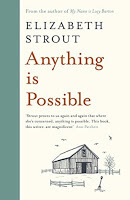 Anything is possible by Elizabeth Stout (connected short stories, audiobook)
Anything is possible by Elizabeth Stout (connected short stories, audiobook)
Last month I read My Name is Lucy Barton, and wrote:
Cool control, that’s how I’d describe Strout’s style. This doesn’t pack the punch of Olive Kitteridge (or even attempt that book’s scope), but it still has teeth. I’ve got Anything is Possible, Strout’s latest queued up as my next read, so I might write more about this one with reference to that.
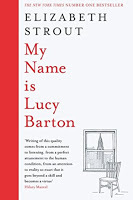 Anything is possible is certainly closer to Olive Kitteridge in scope, and the fact it picks up where Lucy Barton left off might make it even more ambitious. I got the sense, mid-way into the second book, that both MNiLB and AiP had been originally conceived as a single book of connected stories, but the Lucy Barton section grew too big / had sufficient exit velocity to become its own thing, while the gravity of it still influences the stories/chapters in AiP.
Anything is possible is certainly closer to Olive Kitteridge in scope, and the fact it picks up where Lucy Barton left off might make it even more ambitious. I got the sense, mid-way into the second book, that both MNiLB and AiP had been originally conceived as a single book of connected stories, but the Lucy Barton section grew too big / had sufficient exit velocity to become its own thing, while the gravity of it still influences the stories/chapters in AiP.
But unlike Olive Kitteridge, which is most memorable for me because of the complex and often nasty eponymous character and the smudges and shadows of her in some of the other stories in that book, Lucy Barton is without malevolence. She’s the poor girl from the troubled family who got out, made a life in New York City and is now a successful author. So hardly Randle Flagg.
Which is why, for all the concise mini-dramas and the elegant interlocking that goes on in Anything is Possible, it’s missing that hook to really hang around in the reader’s memory.
Gone with the mind by Mark Leyner (novel/memoir, audiobook)
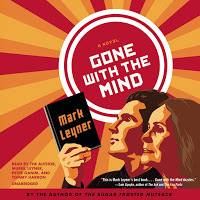 Described on the back cover as a “blazingly inventive, fictional autobiography”, Gone with the Mind begins with Leyner’s mother introducing him for a reading series within a mall’s foodcourt. The only people in the audience are workers on their breaks from Panda Express and Sbarro. The mother’s intro (read in the audiobook my his actual mother) runs for over an hour and covers all many of private and embarrassing things. Then Mark Leyner gets up and gives a few prefatory words before reading excerpts from his autobiography, Gone with the Mind, only these remarks take six or so hours and he never gets to the excerpts. There’s a final section in which Mark and his mother discuss the reading in a bathroom stall.
Described on the back cover as a “blazingly inventive, fictional autobiography”, Gone with the Mind begins with Leyner’s mother introducing him for a reading series within a mall’s foodcourt. The only people in the audience are workers on their breaks from Panda Express and Sbarro. The mother’s intro (read in the audiobook my his actual mother) runs for over an hour and covers all many of private and embarrassing things. Then Mark Leyner gets up and gives a few prefatory words before reading excerpts from his autobiography, Gone with the Mind, only these remarks take six or so hours and he never gets to the excerpts. There’s a final section in which Mark and his mother discuss the reading in a bathroom stall.
The book has blurbs from Gary Shteyngart (don’t they all) and Sam Lipsyte, and these two writers give a pretty good indication of what Leyner’s doing. He loves long medical names and short but impenetrable lapses into theory. His main interlocutor is an imaginary friend (The Imaginary Intern). But amid these deliberately high-grown weeds, there’s a lot of exposure, or apparent exposure. It’s an eloquent, truthy book for an ineloquent, truthy time.
Priestdaddy by Patricia Lockwood (memoir, audiobook)
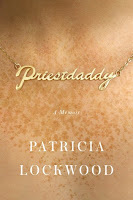 Following closely on the heels of Leyner’s fictional autobiography we have Patricia Lockwood’s poetic memoir. Leyner wrote his book as a 58 year old prostate cancer survivor. Lockwood writes from her early thirties, having limped back to her family home with her husband in tow, for financial reasons. Her father, the improbable Republican, boxer shorts and nothing else, misogynist, guitar hero Catholic priest, is held up as star and hook for the book, but her mother is equally complex and interesting (and gets more time at the mic).
Following closely on the heels of Leyner’s fictional autobiography we have Patricia Lockwood’s poetic memoir. Leyner wrote his book as a 58 year old prostate cancer survivor. Lockwood writes from her early thirties, having limped back to her family home with her husband in tow, for financial reasons. Her father, the improbable Republican, boxer shorts and nothing else, misogynist, guitar hero Catholic priest, is held up as star and hook for the book, but her mother is equally complex and interesting (and gets more time at the mic).
Lockwood writes of her poetry, including publishing the viral hit ‘Rape Joke’ and her first collection, but always with a remove that doesn’t exist when laying bare the working of her family. But her poetic vision and poetic muscle is laid clear enough in the prose of every page, and is given free(ish) rein in the final pages in order to wrap up a memoir as someone in their thirties must (not with knots but frills and flourishes).
 VIDEOGAMES
VIDEOGAMES
I played quite a bit of NBA2k18 to see what gaming in 2017 is like. This is part of what might become a project, or an event, or something I abandon. Who knows?
FILMS
I didn’t watch much of anything in September. I think because I was away a lot and playing NBA2k18 and have been listening to audiobooks while cooking/doing dishes rather than watching something on the iPad. But I’m trying to watch old movies on Kanopy, two of which I watched with my daughter (4). She wasn’t that into Nanook of the North (it held my interest) but we both loved Buster Keaton’s The General. My October project is getting through all the Kurosawas I can with my wife (she hasn’t seen any).
BOOKS
4 3 2 1 by Paul Auster (novel, audiobook)
 After getting a sixth of the way in (and writing about it in my August consumption diary) I didn’t listen to Auster’s forking doorstop for a week thanks to time in Invercargill and Stewart Island.
After getting a sixth of the way in (and writing about it in my August consumption diary) I didn’t listen to Auster’s forking doorstop for a week thanks to time in Invercargill and Stewart Island. And it really is the kind of novel you need to read in a sustained burst, as you’re trying to keep four different versions of Fergusson straight in your head.
Auster is pretty good at differentiating Fergusson 1 from Fergussons 2, 3 and 4, not labouring the differences and not being too repetitive, but it’s still a massive undertaking for a reader to keep everything straight in their head.
Especially when Auster’s two key weapons in sustaining interest and momentum over such a long book are prolepsis (telling us what will happen ahead of time) and ellipsis (leaving things out). I’m particularly fascinated by prolepsis – it’s a move a lot of writers don’t pull. And Auster isn’t a virtuoso like Muriel Spark in the way he uses it – he’s more plodding, more deliberate, less playful. But it’s still fascinating, especially as you need to keep straight which version of Fergusson's future we've been told.
After a few solid hours, I got back in the swing of things and fair devoured the last 20 hours of the audiobook.
I was about an hour from the end when the Booker short-list was announced. I was surprised by the amount of shade thrown in the direction of 4 3 2 1, which made the cut.
Like this from The Irish Times :
Anyone possessed of a sense of humour will smile at the inclusion of US heavyweight veteran Paul Auster with 4321, a bulky work best described as worthy and a lifetime’s personal statement. Repetitive and unconvincing, it is laboured in the extreme and while it was a surprise to see it on the longlist, its inclusion on the shortlist is a shock. So unlikely a contender as this must be the one to wager your house on; the odds will enable you to purchase several more.
“Worthy”? “Repetitive and unconvincing”? “Laboured in the extreme”? Had the writer read the same book? I suspected Ms Battersby did not make it far, if indeed she ever really tried.
But then, in the novel’s final movements, Auster attempts to tie things up in a way that befits the Master Metafictioneer he showed himself to be with books like City of Glass. But here it only served to unravel what had come before and leave me reluctant to defend his book in online comments sections. Maybe it was laboured and worthy? I mean, I wasn't listening to the same book as Auster was reading.
Still, would I rate this over the only other book on the shortlist I've read (Saunder's Lincoln in the Bardo)? Yup (much as I love Saunders short stories).
 Anything is possible by Elizabeth Stout (connected short stories, audiobook)
Anything is possible by Elizabeth Stout (connected short stories, audiobook)Last month I read My Name is Lucy Barton, and wrote:
Cool control, that’s how I’d describe Strout’s style. This doesn’t pack the punch of Olive Kitteridge (or even attempt that book’s scope), but it still has teeth. I’ve got Anything is Possible, Strout’s latest queued up as my next read, so I might write more about this one with reference to that.
 Anything is possible is certainly closer to Olive Kitteridge in scope, and the fact it picks up where Lucy Barton left off might make it even more ambitious. I got the sense, mid-way into the second book, that both MNiLB and AiP had been originally conceived as a single book of connected stories, but the Lucy Barton section grew too big / had sufficient exit velocity to become its own thing, while the gravity of it still influences the stories/chapters in AiP.
Anything is possible is certainly closer to Olive Kitteridge in scope, and the fact it picks up where Lucy Barton left off might make it even more ambitious. I got the sense, mid-way into the second book, that both MNiLB and AiP had been originally conceived as a single book of connected stories, but the Lucy Barton section grew too big / had sufficient exit velocity to become its own thing, while the gravity of it still influences the stories/chapters in AiP. But unlike Olive Kitteridge, which is most memorable for me because of the complex and often nasty eponymous character and the smudges and shadows of her in some of the other stories in that book, Lucy Barton is without malevolence. She’s the poor girl from the troubled family who got out, made a life in New York City and is now a successful author. So hardly Randle Flagg.
Which is why, for all the concise mini-dramas and the elegant interlocking that goes on in Anything is Possible, it’s missing that hook to really hang around in the reader’s memory.
Gone with the mind by Mark Leyner (novel/memoir, audiobook)
 Described on the back cover as a “blazingly inventive, fictional autobiography”, Gone with the Mind begins with Leyner’s mother introducing him for a reading series within a mall’s foodcourt. The only people in the audience are workers on their breaks from Panda Express and Sbarro. The mother’s intro (read in the audiobook my his actual mother) runs for over an hour and covers all many of private and embarrassing things. Then Mark Leyner gets up and gives a few prefatory words before reading excerpts from his autobiography, Gone with the Mind, only these remarks take six or so hours and he never gets to the excerpts. There’s a final section in which Mark and his mother discuss the reading in a bathroom stall.
Described on the back cover as a “blazingly inventive, fictional autobiography”, Gone with the Mind begins with Leyner’s mother introducing him for a reading series within a mall’s foodcourt. The only people in the audience are workers on their breaks from Panda Express and Sbarro. The mother’s intro (read in the audiobook my his actual mother) runs for over an hour and covers all many of private and embarrassing things. Then Mark Leyner gets up and gives a few prefatory words before reading excerpts from his autobiography, Gone with the Mind, only these remarks take six or so hours and he never gets to the excerpts. There’s a final section in which Mark and his mother discuss the reading in a bathroom stall.The book has blurbs from Gary Shteyngart (don’t they all) and Sam Lipsyte, and these two writers give a pretty good indication of what Leyner’s doing. He loves long medical names and short but impenetrable lapses into theory. His main interlocutor is an imaginary friend (The Imaginary Intern). But amid these deliberately high-grown weeds, there’s a lot of exposure, or apparent exposure. It’s an eloquent, truthy book for an ineloquent, truthy time.
Priestdaddy by Patricia Lockwood (memoir, audiobook)
 Following closely on the heels of Leyner’s fictional autobiography we have Patricia Lockwood’s poetic memoir. Leyner wrote his book as a 58 year old prostate cancer survivor. Lockwood writes from her early thirties, having limped back to her family home with her husband in tow, for financial reasons. Her father, the improbable Republican, boxer shorts and nothing else, misogynist, guitar hero Catholic priest, is held up as star and hook for the book, but her mother is equally complex and interesting (and gets more time at the mic).
Following closely on the heels of Leyner’s fictional autobiography we have Patricia Lockwood’s poetic memoir. Leyner wrote his book as a 58 year old prostate cancer survivor. Lockwood writes from her early thirties, having limped back to her family home with her husband in tow, for financial reasons. Her father, the improbable Republican, boxer shorts and nothing else, misogynist, guitar hero Catholic priest, is held up as star and hook for the book, but her mother is equally complex and interesting (and gets more time at the mic). Lockwood writes of her poetry, including publishing the viral hit ‘Rape Joke’ and her first collection, but always with a remove that doesn’t exist when laying bare the working of her family. But her poetic vision and poetic muscle is laid clear enough in the prose of every page, and is given free(ish) rein in the final pages in order to wrap up a memoir as someone in their thirties must (not with knots but frills and flourishes).
 VIDEOGAMES
VIDEOGAMESI played quite a bit of NBA2k18 to see what gaming in 2017 is like. This is part of what might become a project, or an event, or something I abandon. Who knows?
FILMS
I didn’t watch much of anything in September. I think because I was away a lot and playing NBA2k18 and have been listening to audiobooks while cooking/doing dishes rather than watching something on the iPad. But I’m trying to watch old movies on Kanopy, two of which I watched with my daughter (4). She wasn’t that into Nanook of the North (it held my interest) but we both loved Buster Keaton’s The General. My October project is getting through all the Kurosawas I can with my wife (she hasn’t seen any).
Published on October 01, 2017 17:00
September 24, 2017
Candle in the Wind: Fortnight 17 of The Burns
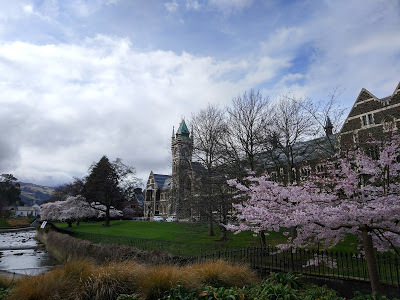 Spring on campusI set myself the goal of writing 15,000 all-purpose words this fortnight.
Spring on campusI set myself the goal of writing 15,000 all-purpose words this fortnight.I failed. (If only I could have stung this blogpost out a little longer)
Total wordcount: 14,543 (52% on the novel, 34% on essays, 13% on this blog and 1% on short stories [editing one I wrote in Feb])1st week: 6,109 words (4 writing days)2nd week: 8,434 words (6 writing days)
*
I lost a writing day on the first week because I was doing parenting things one morning, then met with the Dunedin UNESCO City of Literature Collaboration Group in the afternoon. I was invited to tell them about what I’d been up to as the Burns Fellow, for which these fortnightly posts proved VERY useful. I’ve parlayed my notes into some text for the University’s website, which should show up here in the next week or so.
*
Has anyone else’s September been especially slippery? Like: it’s almost gone?!
*
The novel? Well. It’s a bit like my life story – it gets longer every time I tell it.
And while the climbing pagecount of the first draft is good – I need something to which I can apply my scalpel to create drafts two through twenty-six – right now it feels like dangerous territory. Like this is the part of the novel where readers will feel I lost the initial thread, where it was written too quickly and no matter how hard I try to unify the whole and fulfill the promises of the back cover, the first quarter, first half, I won’t be able to unwrite the wrong turns I’m writing now.
But ask me again next fortnight and I’ll feel different. Hopefully better different.
*
My wife went up to Auckland on Friday and was due to arrive home around 8pm tonight, but her plane couldn’t land in Dunedin because it was too windy (!) and they had to land in Christchurch. The earliest flight from CHC to DND isn’t till 4pm tomorrow, so they all flew back to Auckland and she should land in DND 9:30am tomorrow.
Fuel crisis? What fuel crisis?
The upshot of this is that I have another evening to my own devices.
(I’m secretly glad I’m due another one of these update posts as three-nights/two-days of solo-parenting 2 kids (4 and 2) means I’m not really up to writing fiction (especially when I feel like what I’m writing in the best possible physical and mental situation isn’t cutting the mustard). So, lucky you.)
*
I'm one of two judges for this year's Robbie Burns Poetry Comp. Entries open now. Winners get cash money; judges get, um, interviewed by the ODT about judging.
*
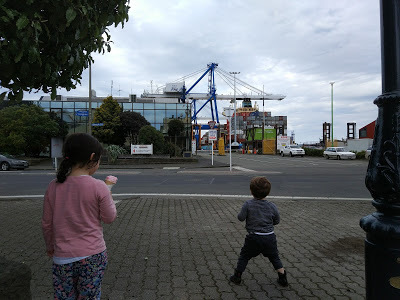 At least one of my offspring shares my interest in container shipping.(The kids have been great, by the way, and I've had a blast. I just didn't leave a lot in the tank for tonight/tomorrow morning.)
At least one of my offspring shares my interest in container shipping.(The kids have been great, by the way, and I've had a blast. I just didn't leave a lot in the tank for tonight/tomorrow morning.)*
I took the kids to Doctors Point on Blueskin Bay yesterday. It only took 30 minutes to get there, but it made me think how many places there are around Dunedin that are kinda like Halfmoon Bay on Stewart Island, except for the BEING A HELLISH FERRY RIDE AWAY FROM THE MAINLAND.
I'll admit, while on Rakiura I had the odd romantic thought about moving there. Simpler, more rugged life, etc.
But you can have that in Blueskin Bay or Long Beach or Bull Creek or Kaka Point.
People who move to Stewart Island are basically elite hipsters, like the ones who eschew fixie bikes for penny farthings, or write their cafe poetry ON A TYPEWRITER.
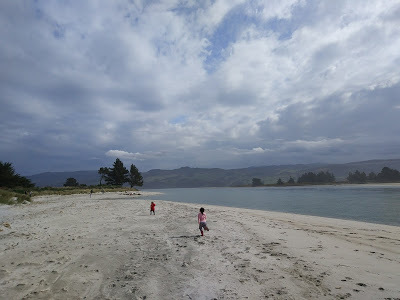 Doctors Point (my kids enjoy my company, honest)
Doctors Point (my kids enjoy my company, honest)*
Let’s not talk about the election.
Next week, after one or two beers, then we can talk.
It's just a little weird that I've been a public servant since 2004 (starting in Queensland, with a 2 year gap while in Edinburgh) and have never gone through a change of Government. Maybe 2020? Or maybe Winston does Winston-things?
Sorry. Not talking about the election from: NOW.
Published on September 24, 2017 02:52
September 11, 2017
Blazing skies: Fortnight 16 of the Burns
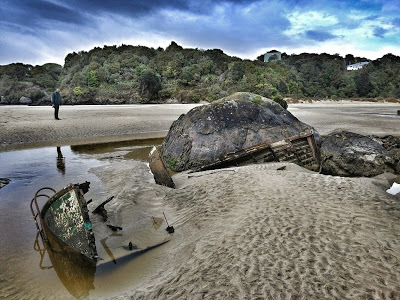 Bathing Beach, Rakiura
Bathing Beach, RakiuraFortnight 16 wordcounts
Total words: 8,633 words (70% on an essay, 21% on this blog, 9% on the novel)1st week: 8,633 words (4 day week because I left for Invercargill on Friday morning...)2nd week: 0 wordsThat essay was my thing on 'The Moves in Contemporary NZ Short Stories', for the conference I talk about more below, and it'll be posted online in due course. Some of that wordcount includes the work I did cataloguing every move in two short stories as a proof of concept for what a more data-driven analytical approach might entail.
Dan Davin Short Story Conference
This was the first conference focussed on the short story in NZ in decades. I think everyone involved (and hopefully some of those who were not) feels the experience should now be repeated - whether it's annual or bi-annual, there's plenty to be said for, and lots to be gained from, bringing together writers, academics and readers who are passionate about the short story.
Things kicked off on Friday night (1 Sept) at the Civic Theatre in Invercargill with the prize-giving for the Dan Davin short story competition and a keynote from Janet Wilson.
Saturday was wall-to-wall presentations (including mine), keynotes and panels. You can read more about who talked about what here.
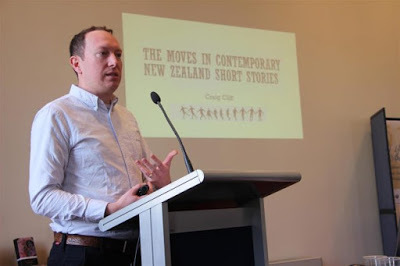 Me, presenting
Me, presenting(This photo and the ones at Stirling Pt and the marae courtesy of the Southland Express article here)
Sunday we all boarded a bus and went to Te Rau Aroha Marae in Bluff (via Dan Davin's childhood home, Stirling Point and Bluff Hill).
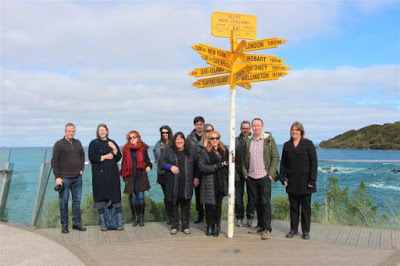 Conference folk, Stirling Point, Bluff
Conference folk, Stirling Point, BluffThe wharenui was designed by Cliff Whiting, and the wharekai was also decked out with the fruits of collaborations between Whiting and local hapu. Bubba Thompson was there from day one of the project and he was there for us that day to share all the knowledge and whakapapa that went into that amazing place.
I've spent 30+ hours in the marae on the top floor of Te Papa in Wellington, which was also designed by Whiting, thanks to all those Writers on Mondays sessions over the years, and there's always something new to look at.
But being there in Bluff, in a living, breathing (not to mentioned the world's most southernmost) marae, it was next level.
When Bubba explained how the wharenui demonstrated inclusiveness (each of the tīpuna were females who'd married Pakeha, with the whalers and sealers depicted in some of the friezes), and there was a wall dedicated to people who'd come to Bluff on any of the four winds so that there was somewhere for everyone find themselves.
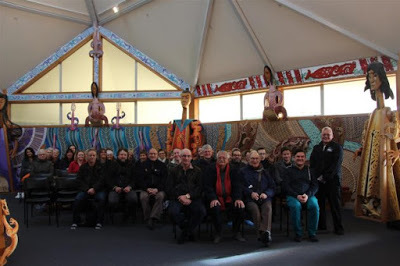 The start of Day 3, Te Rau Aroha Marae, Bluff
The start of Day 3, Te Rau Aroha Marae, BluffTwo more papers were presented in the wharenui and then Cilla McQueen put the perfect bow on proceedings by reading a Dan Davin story set in Bluff (in which the protagonist muses about relations between Pakeha and Maori).
After a great lunch, it was time to leave Te Rau Aroha and Bluff, so we swung back to Invercargill, checked out the Basilica that Davin's family attended, then headed on to Riverton. I left the bus there and joined my family (more on this part of the trip in a sec).
I'm really glad I made the effort to attend, and present at, the conference. It left me with a half dozen ideas, some of which I can achieve alone in front of a computer but many focus on ways to bring more of us together, to expand conversations, dive deep into ideas, and push the short story forward here at the edge of the world.
Non-literary tourism
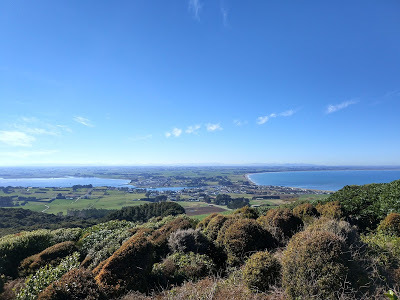 Riverton from up More's ReserveMe and the whanau spent two nights in Riverton, then caught the ferry from Bluff to Rakiura/Stewart Island and stayed in Oban for four nights. My brother joined us for this stretch.
Riverton from up More's ReserveMe and the whanau spent two nights in Riverton, then caught the ferry from Bluff to Rakiura/Stewart Island and stayed in Oban for four nights. My brother joined us for this stretch.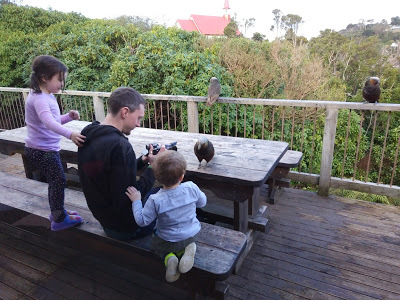 My kids, my bro, kaka
My kids, my bro, kaka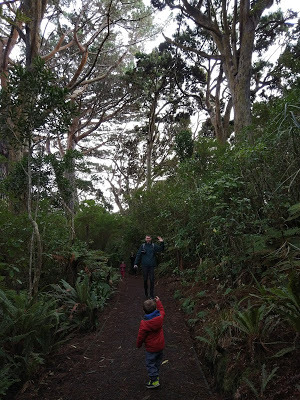 Ulva IslandThe kaka joined us on the deck every afternoon around four. The weka and robins on Ulva Island were equally friendly (although the weka tipped over to annoying when we tried to eat lunch on the beach). I saw a flock of about a dozen mohua/yellowhead making their way through the bush, tomtits doing acrobatics on the sand (presumably in pursuit of unseen insects), brown creepers being brown and creepy. I forgot to bring my proper camera on this trip, which I only use these days for snapping birds, so you'll have to take my word for this, eh?
Ulva IslandThe kaka joined us on the deck every afternoon around four. The weka and robins on Ulva Island were equally friendly (although the weka tipped over to annoying when we tried to eat lunch on the beach). I saw a flock of about a dozen mohua/yellowhead making their way through the bush, tomtits doing acrobatics on the sand (presumably in pursuit of unseen insects), brown creepers being brown and creepy. I forgot to bring my proper camera on this trip, which I only use these days for snapping birds, so you'll have to take my word for this, eh?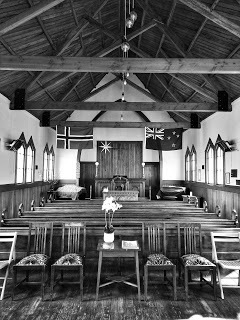 Inside the Oban Presbyterian ChurchMy brother and I went on a gonzo kiwi spotting trip one night but came up empty. He went out the next night in pursuit of the Aurora Australis, which was supposed to be flaring up, but the cloud cover/drizzle did him in.
Inside the Oban Presbyterian ChurchMy brother and I went on a gonzo kiwi spotting trip one night but came up empty. He went out the next night in pursuit of the Aurora Australis, which was supposed to be flaring up, but the cloud cover/drizzle did him in.In non-bird/celestial matters, we managed to see quite a bit of the area around Halfmoon Bay (but still only a fraction of the island) despite having a two-year-old and a four-year-old in tow, thanks to the day we rented electric bikes (one for each adult) and a two-seater kiddie trailer which was attached to my bike. E-bikes are fun, and when you add in the hills, the sections of unsealed roads, the sudden icy downpour just before lunch and the fact I was towing 35 kgs of preschooler, the e-sistance was VERY welcome. We managed to get out to the lighthouse at Ackers Point, Deep Bay, Butterfield Beach, Horseshoe Bay and the start of the Rakiura Track at Lee Bay - and get my son down for a nap in the middle of the day.
I definitely want to go back and do the track when the kids are older (they did pretty darn well with the walk to Golden Bay to catch the water taxi and then bossing it around Ulva Island for 3.5 hours, though a fair bit of that was spent with one or the other kid on my shoulders).
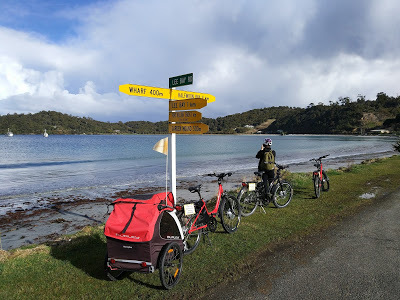 Bikes, Horseshoe Bay
Bikes, Horseshoe Bay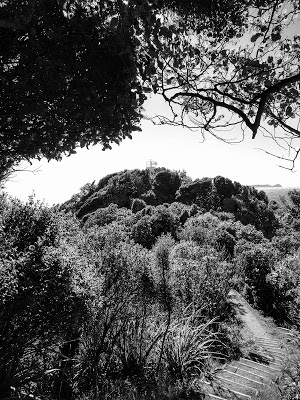 Ackers Point Lighthouse
Ackers Point Lighthouse Bathing Beach
Bathing Beach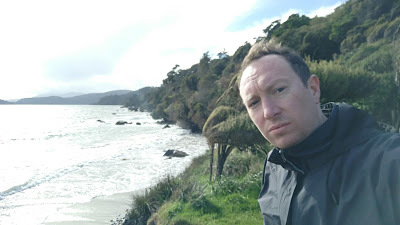 Windswept, Lees BayOn our last night the five of us hung out at the South Seas Hotel, had a few jugs (well, the adults did at least) with the locals and had a decent pub feed. Message to Lorde: try the onion rings - best I've had!
Windswept, Lees BayOn our last night the five of us hung out at the South Seas Hotel, had a few jugs (well, the adults did at least) with the locals and had a decent pub feed. Message to Lorde: try the onion rings - best I've had!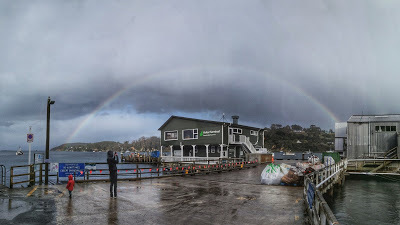 Ominous rainbow before the ferry crossing home
Ominous rainbow before the ferry crossing homeThe ferry ride back on Saturday was rough.
Like: 5 metre swells.
Like: that scene in The Wolf of Wall Street where Leo DiCaprio's luxury launch is pounded by a storm and the only way that could be fun is if you were coked out of your mind.
Like: my wife threw up four times, me once (we both took SeaLegs the night before and that morning) and my son was sick too (I thought two was too young for motion sickness) before being rendered unconscious by the rocking.
My daughter spent the middle 30 minutes of the voyage hunched over a sickbag, groaning/whining, but never actually spewed (which meant she was the slowest to recover when we got back on land).
So yeah, total nightmare, but kinda to be expected when crossing the Foveaux Strait.
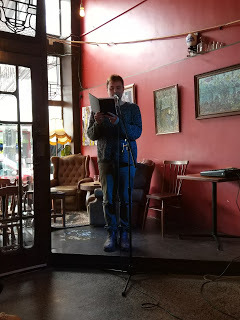 Tom Sainsbury reading his crack-up GoT fan ficNZ Young Writers Festival
Tom Sainsbury reading his crack-up GoT fan ficNZ Young Writers FestivalMy trip way down south was planned before I knew the dates for this year's Young Writers Festival, so I missed all of it except for the last session, which was a Fan Fiction event hosted by man/snapchatter of the moment, Tom Sainsbury.
Tom read some Game of Thrones fan fic (small quibble: he said his protagonist was a White Walker but the way he was described he sounded more like a wight). Jack Vening read some Benjamin Button fan fic (very niche, very dark) and Rhydian Thomas did a very NSFW/R18 mash up of Beckett and Secret Diary of a Call Girl, featuring Bill English.
The only bum note was a piece about George Bush written by some dude who didn't show up but sent his friend to deliver his pages of A4, which Aaron Hawkins, Dunedin City Councillor and a driving force behind NZYWF, read out admirably.
So yeah, it was odd, a bit ragged around the edges, but funny and warm, too, which is exactly what this kind of lowkey, free, non-ticketed festival should be.
Published on September 11, 2017 02:45



